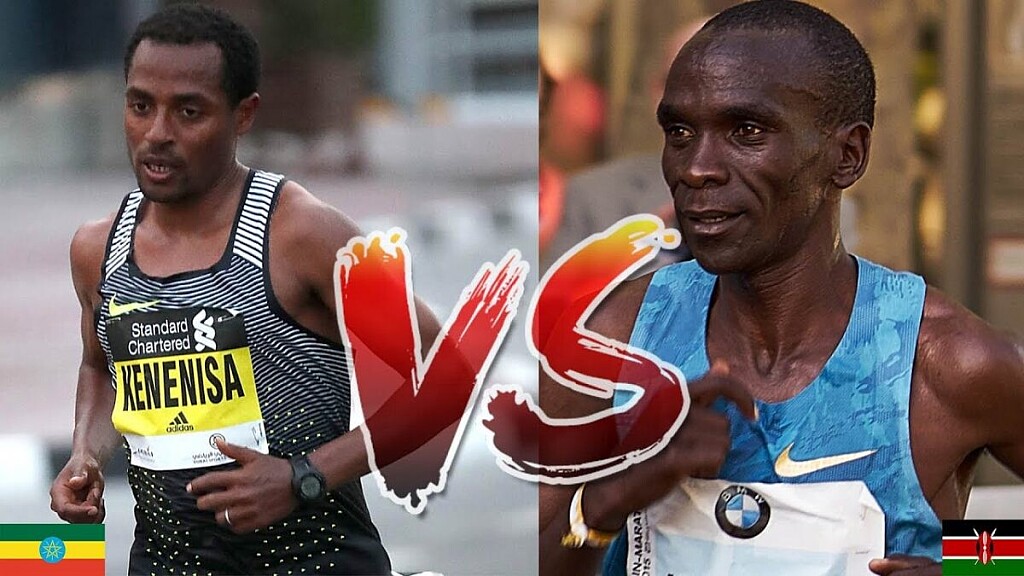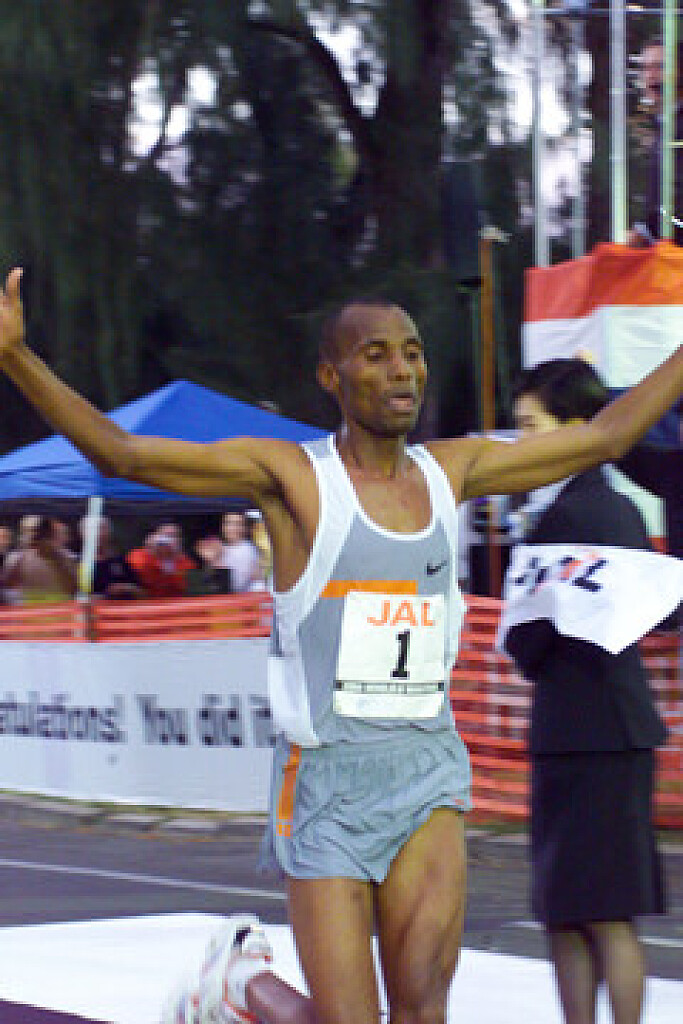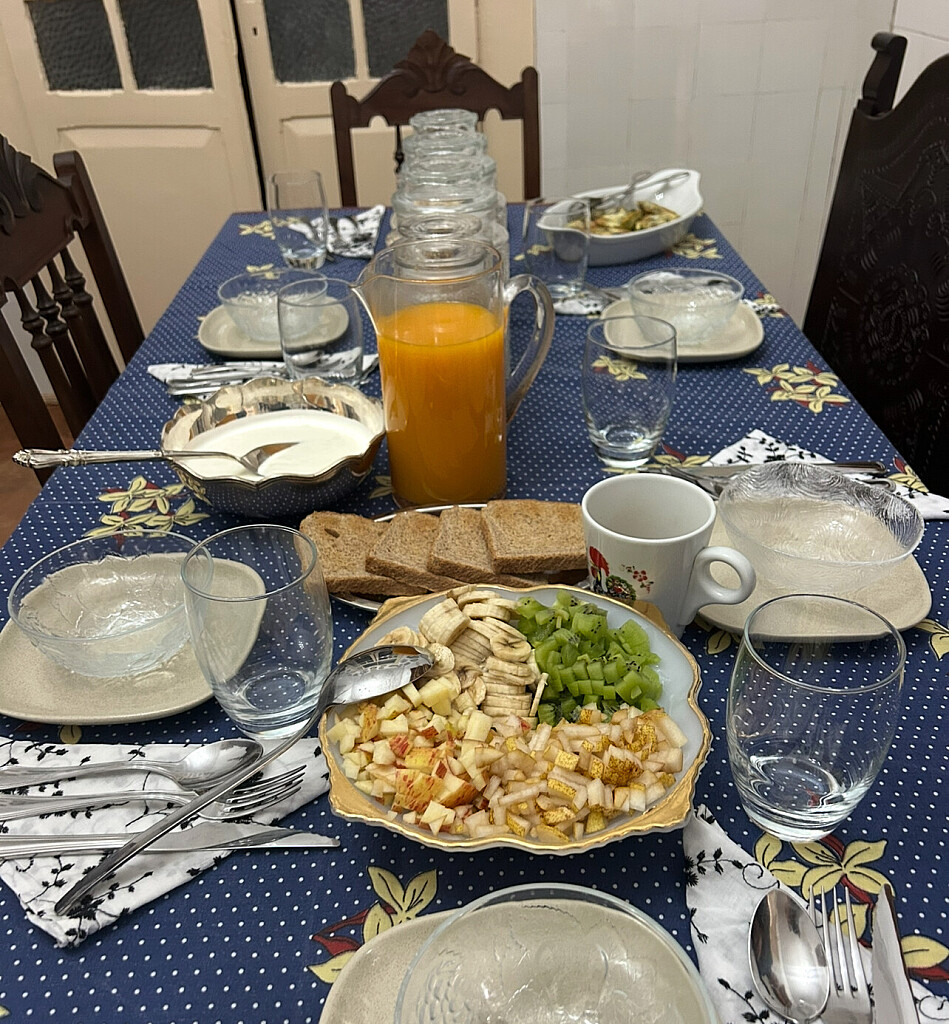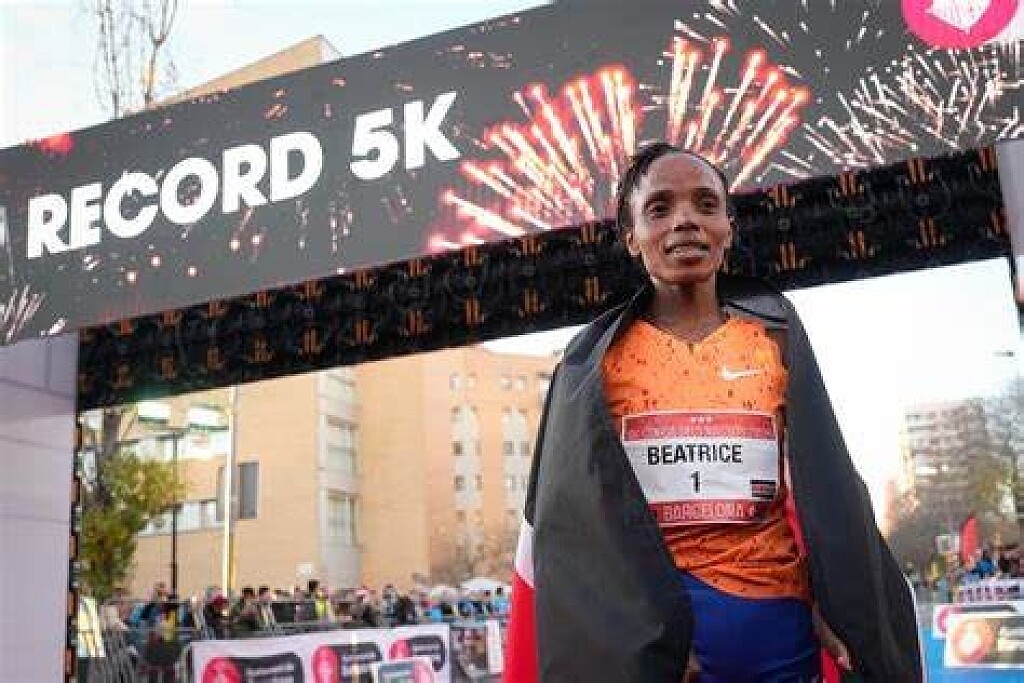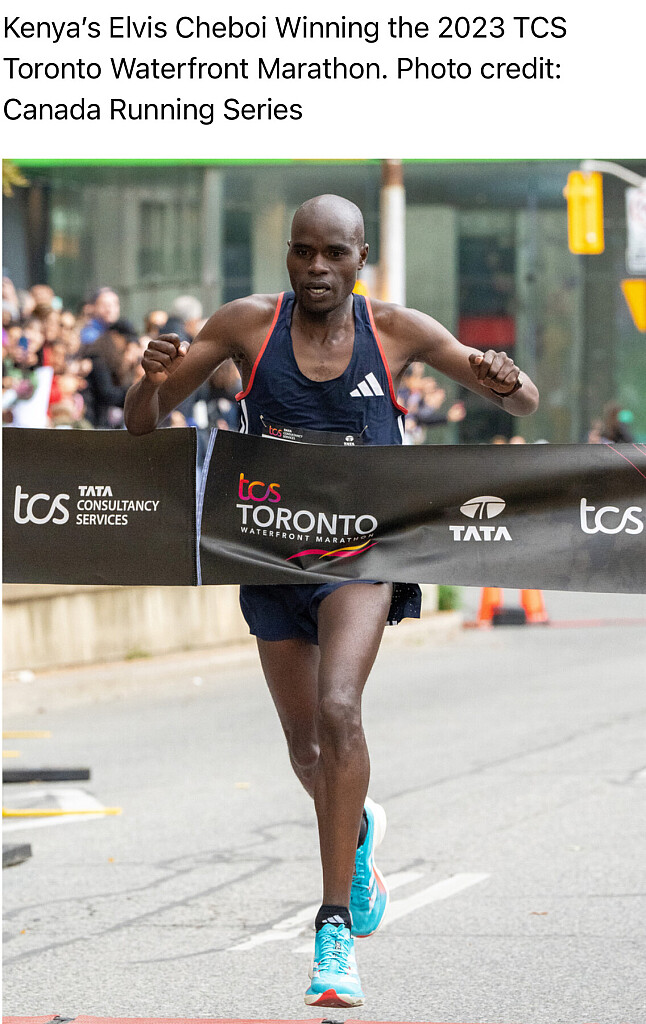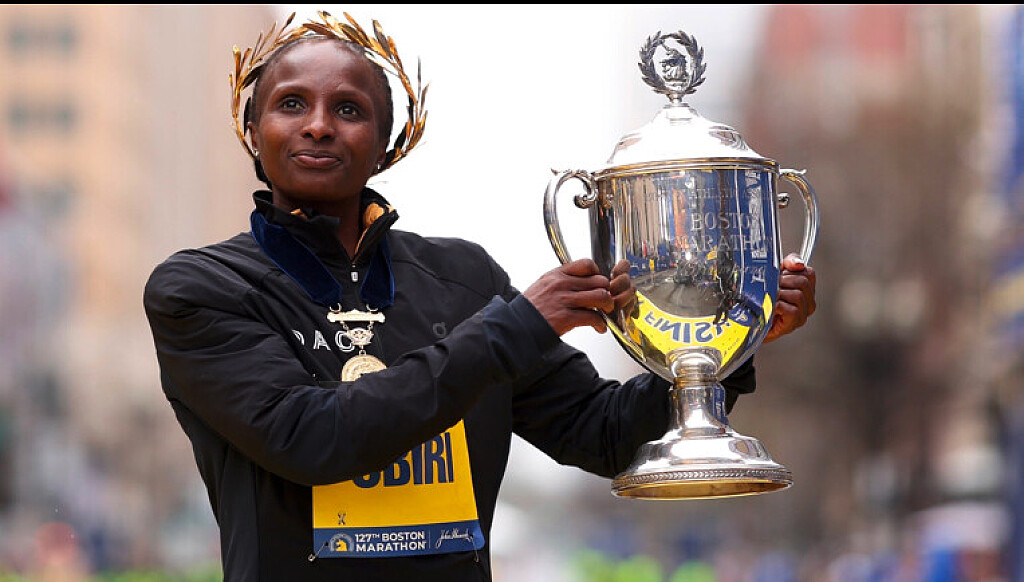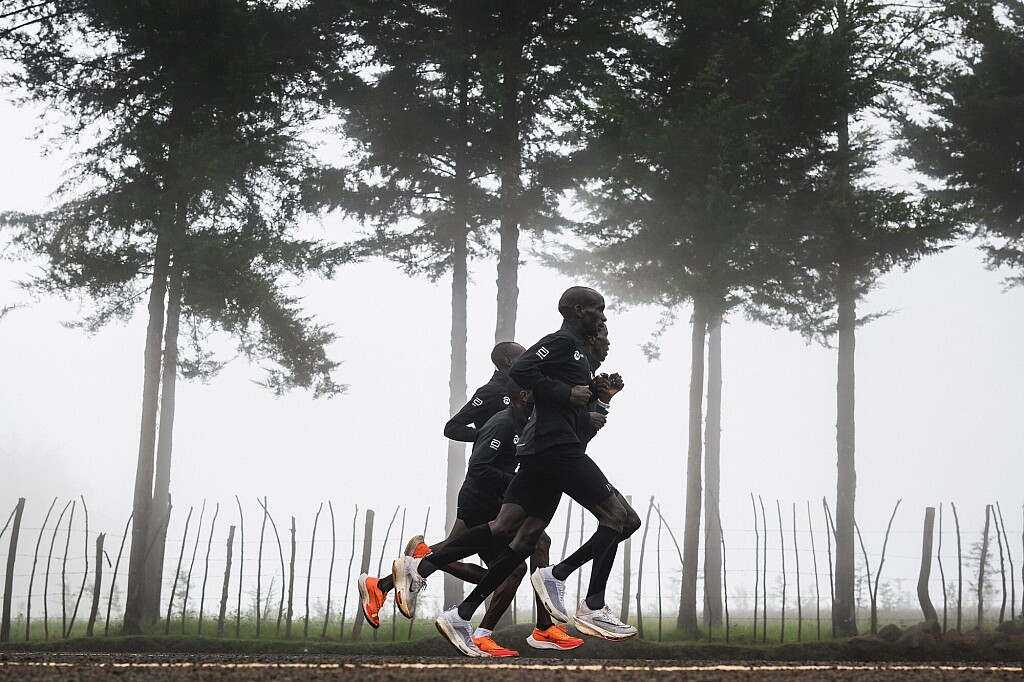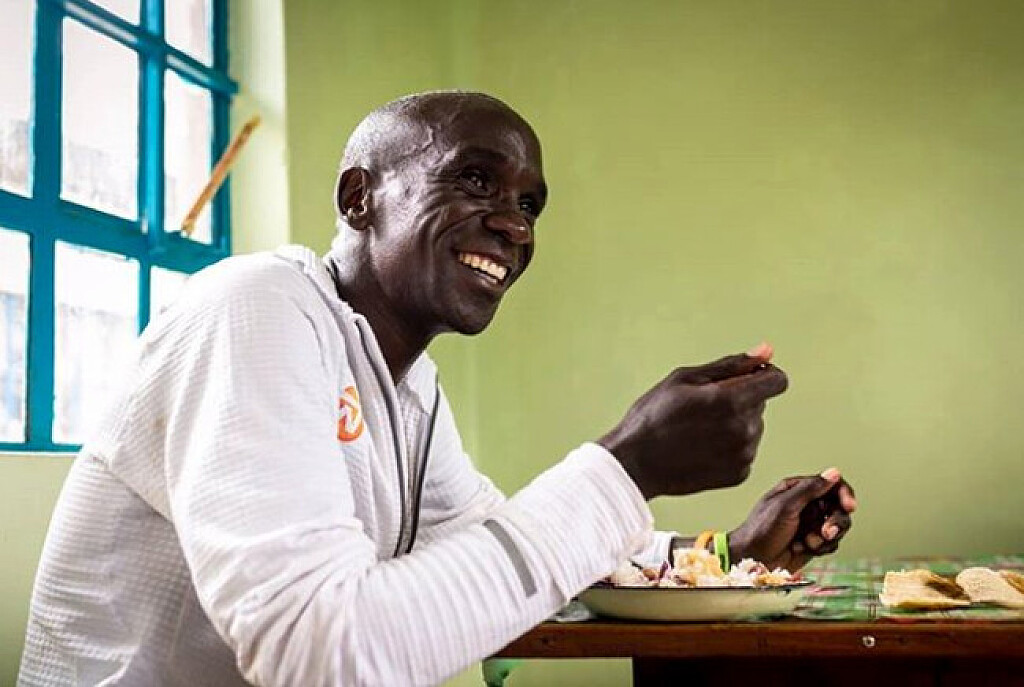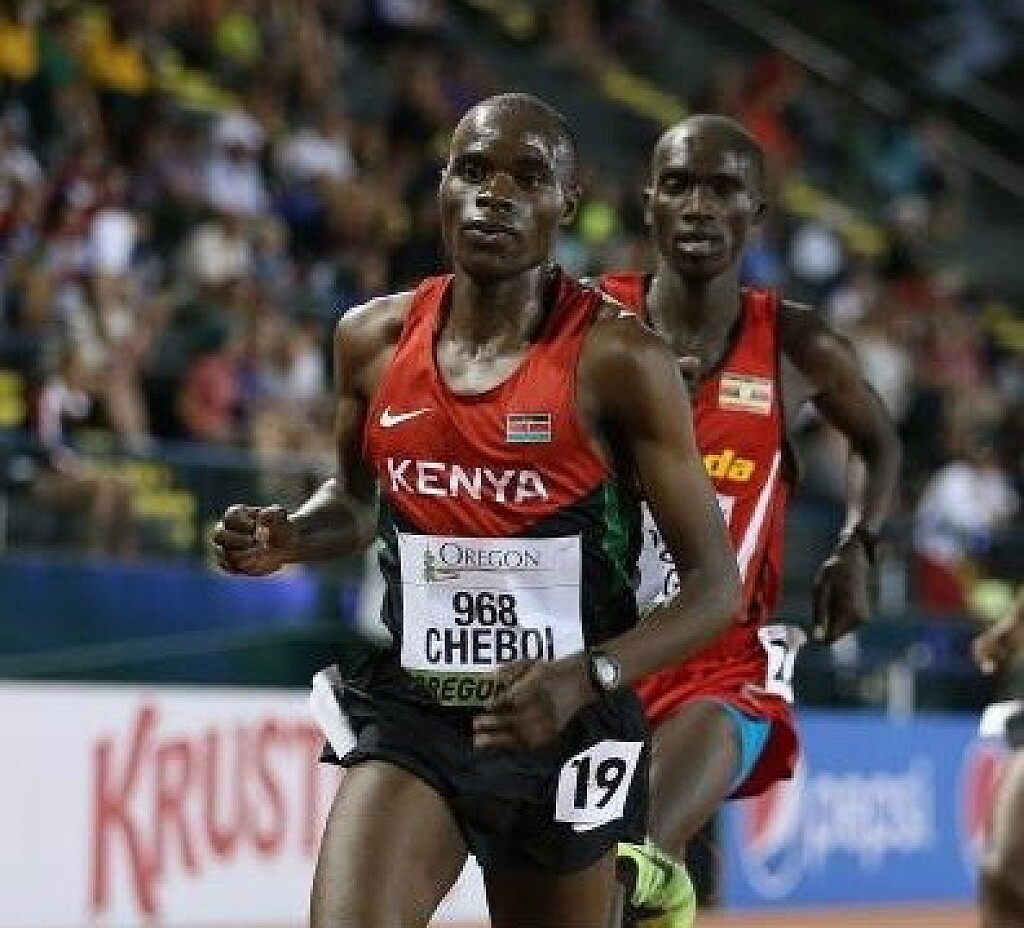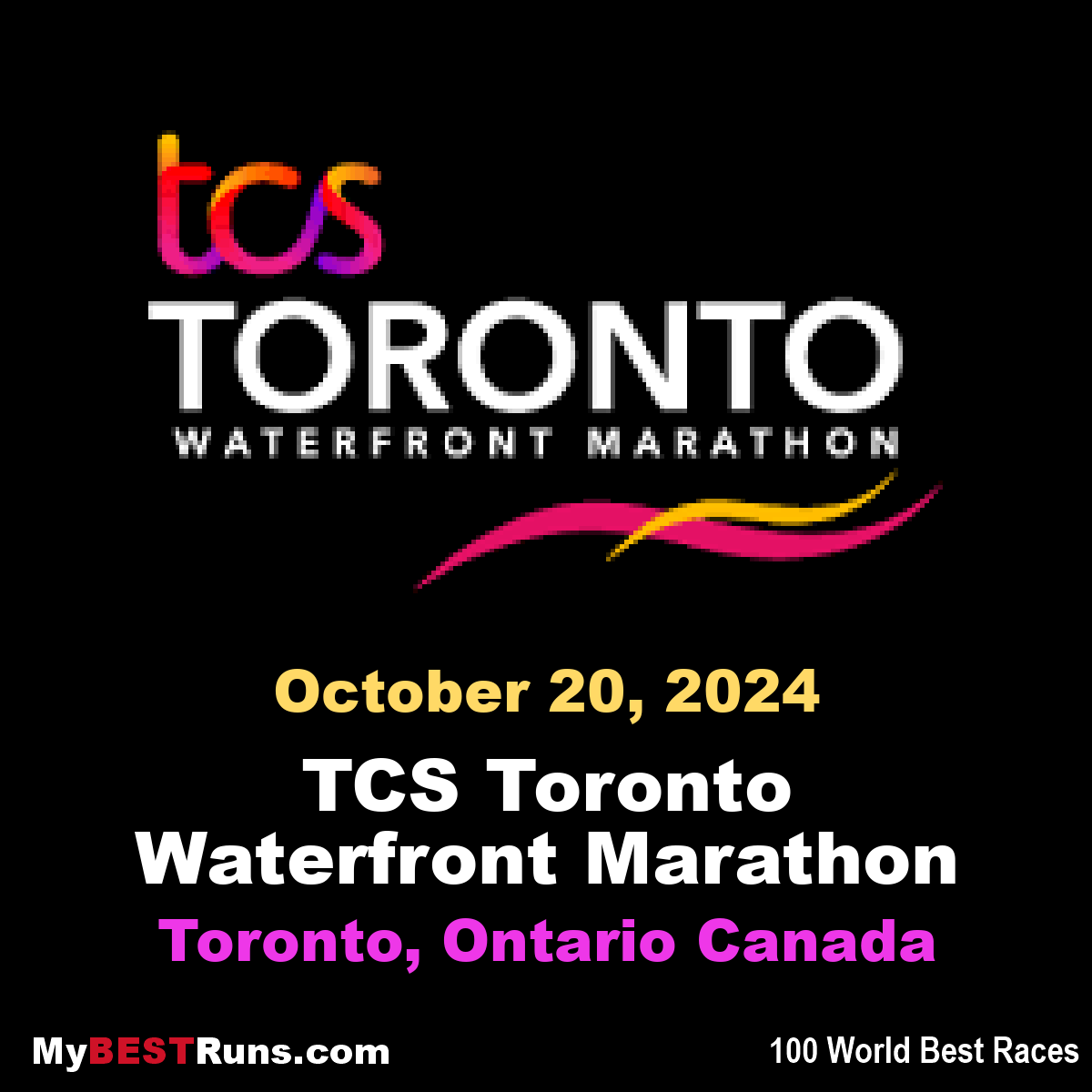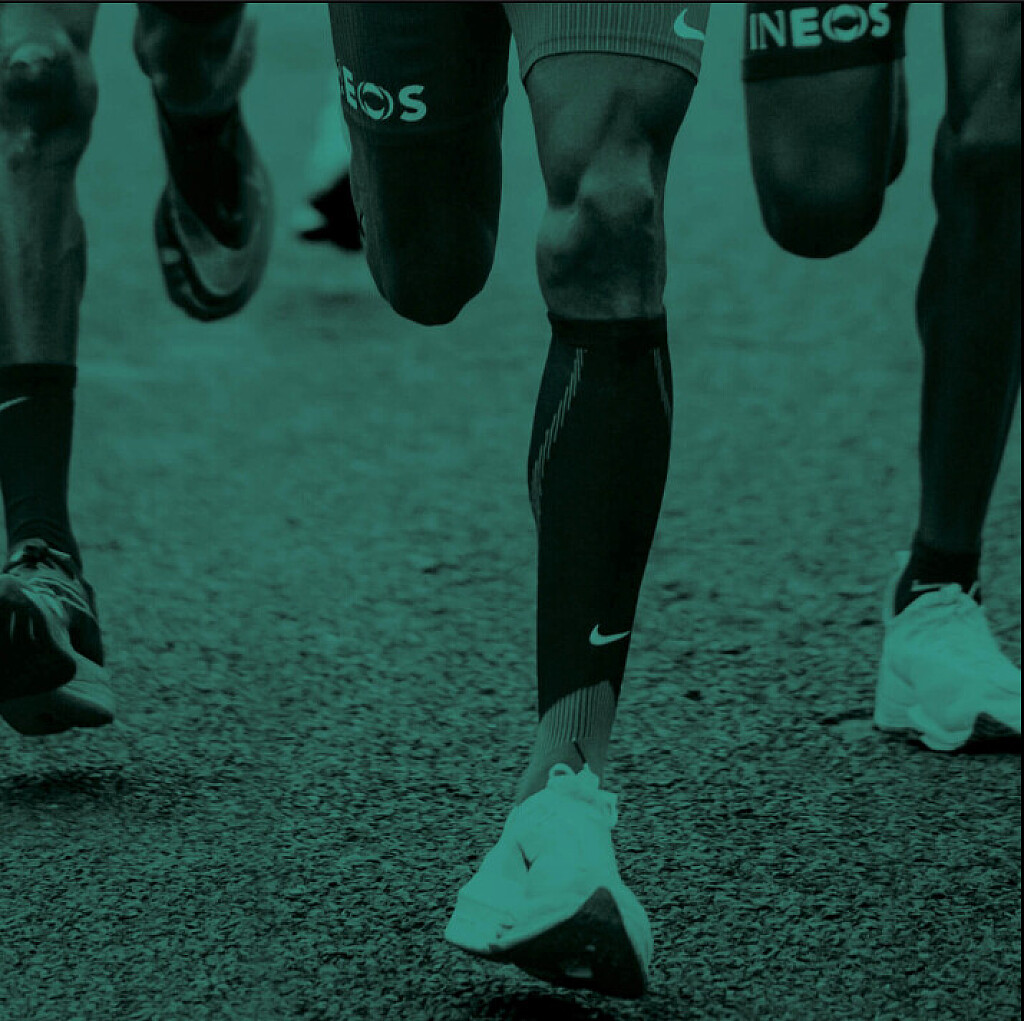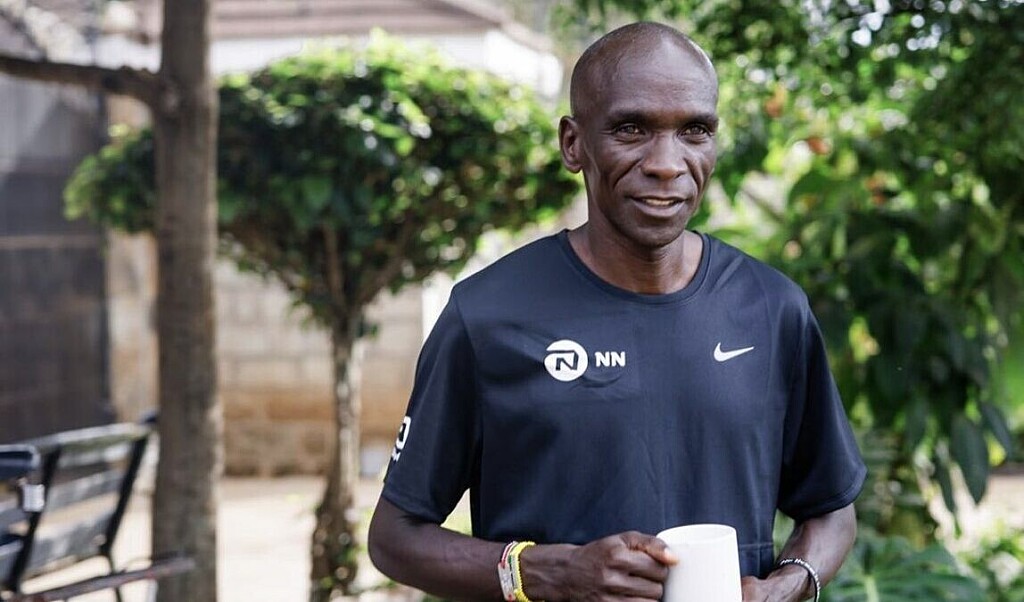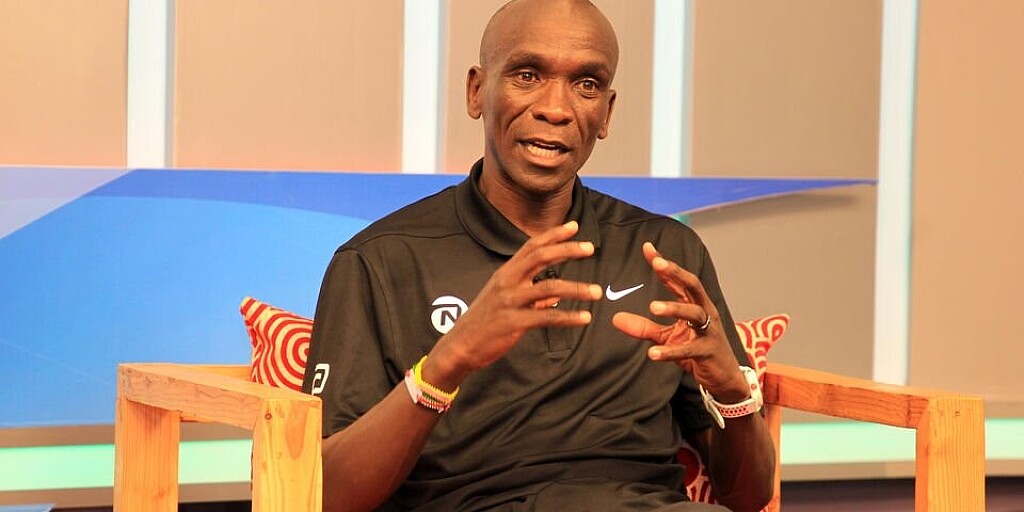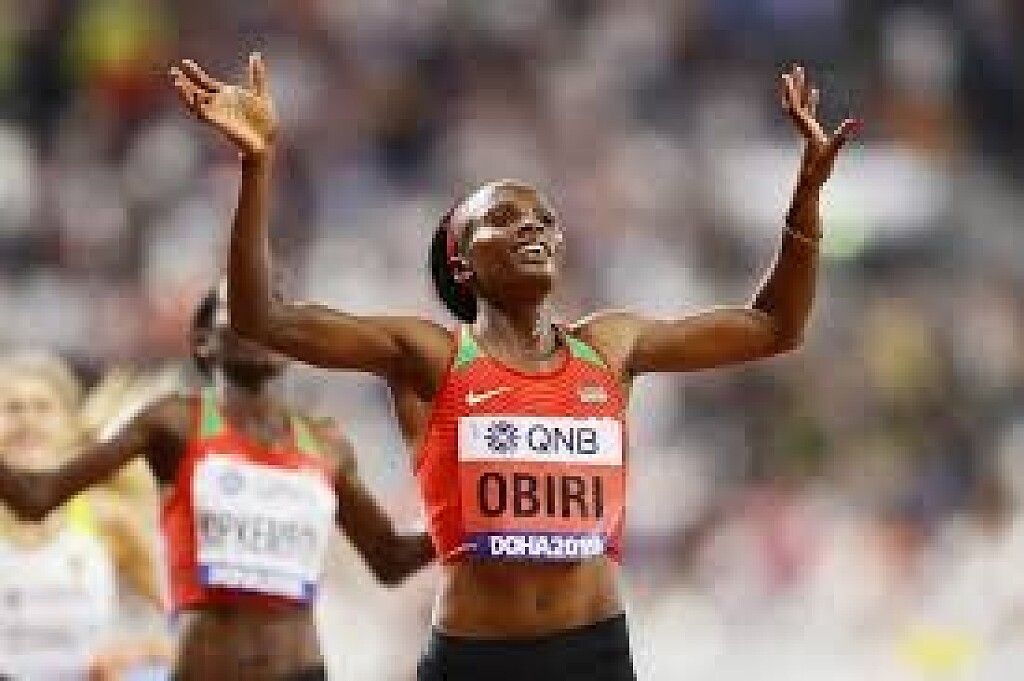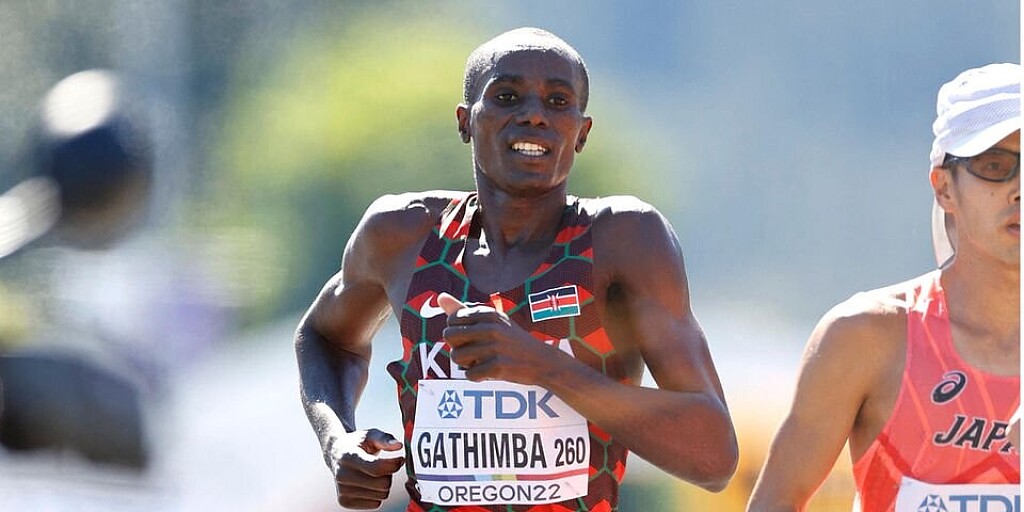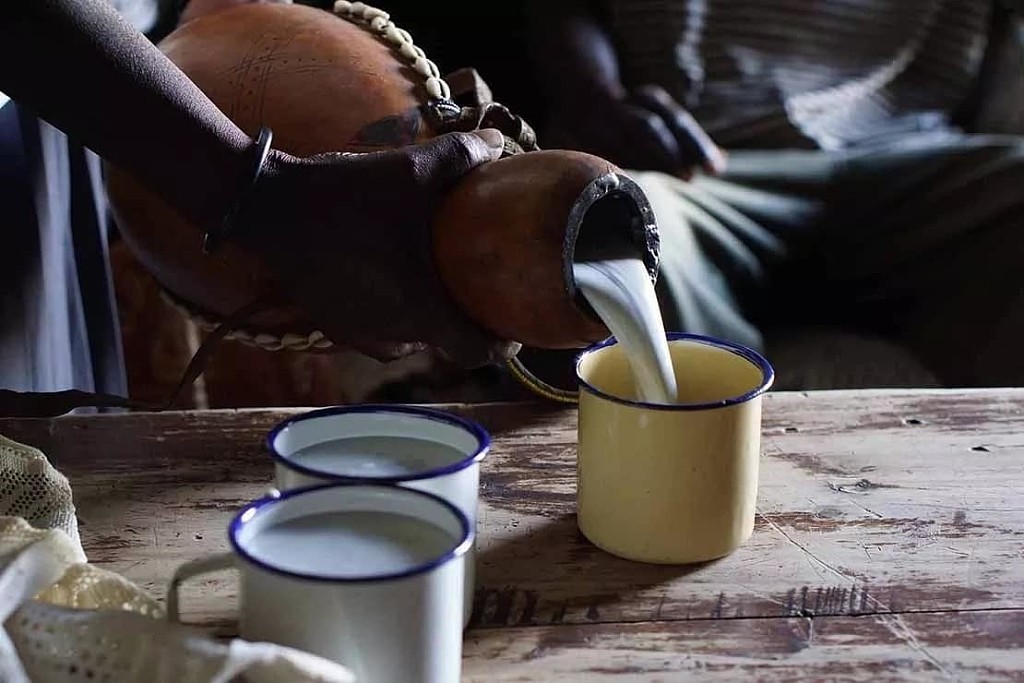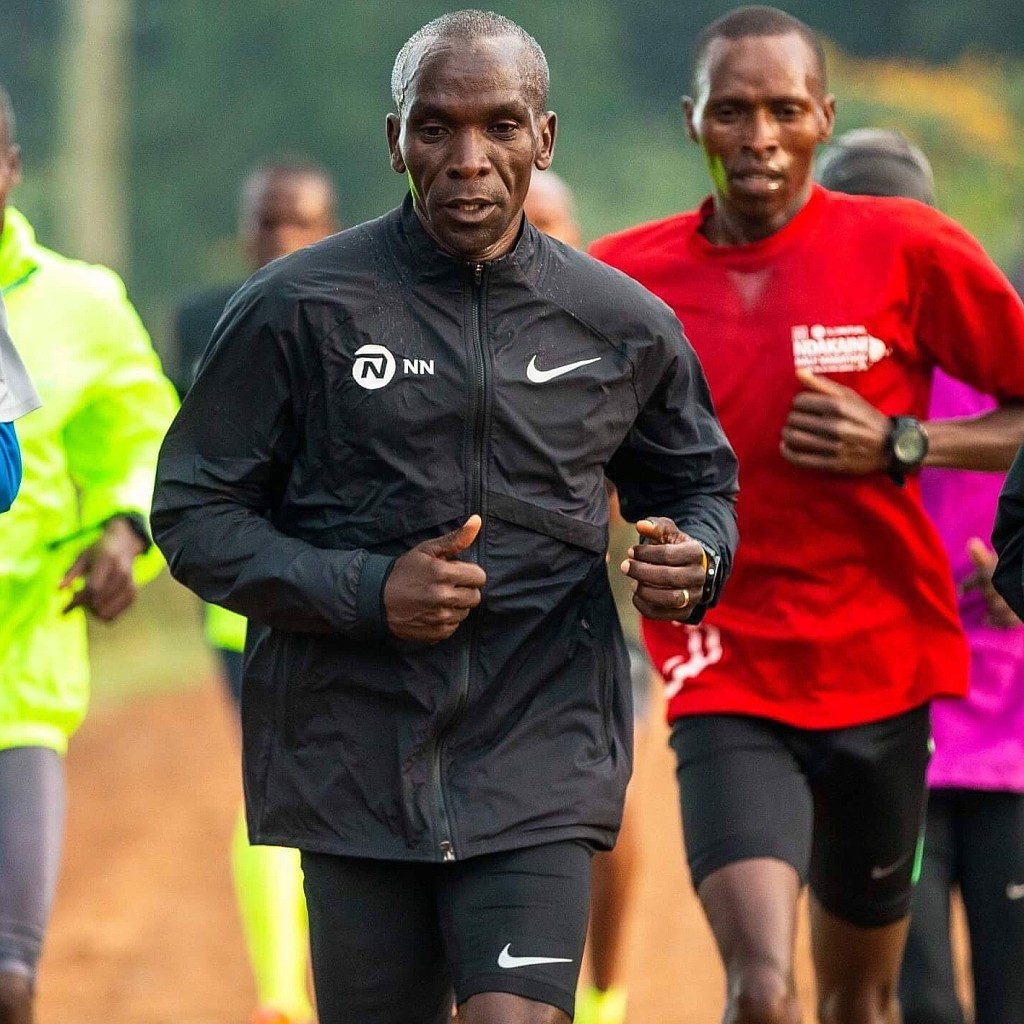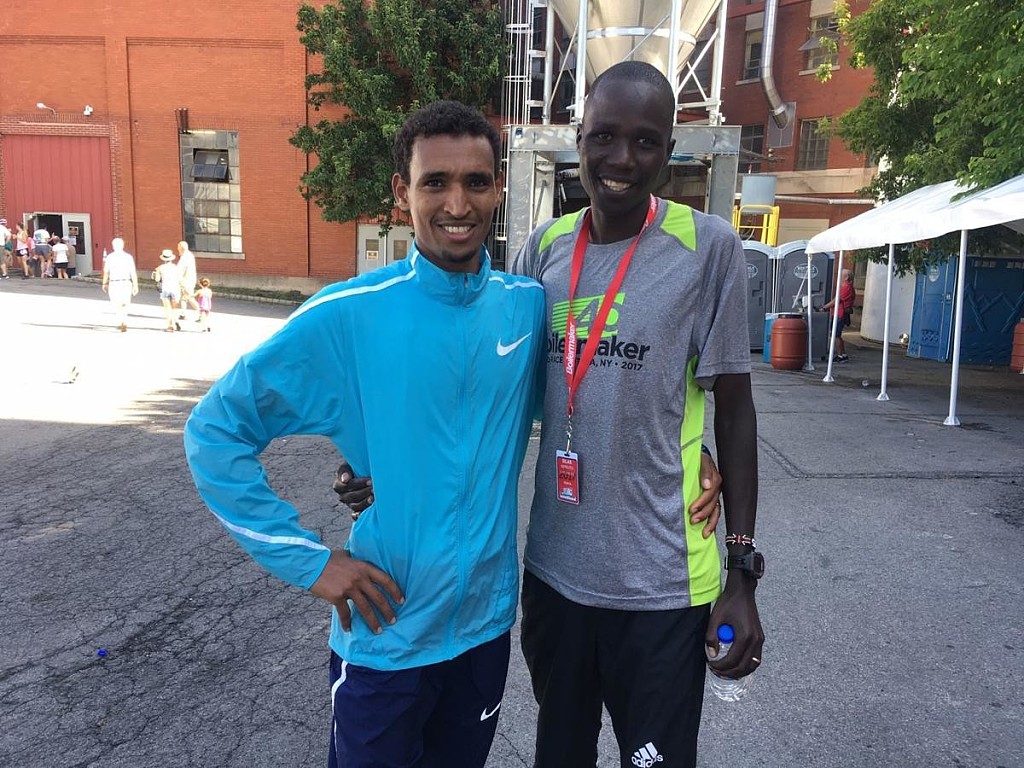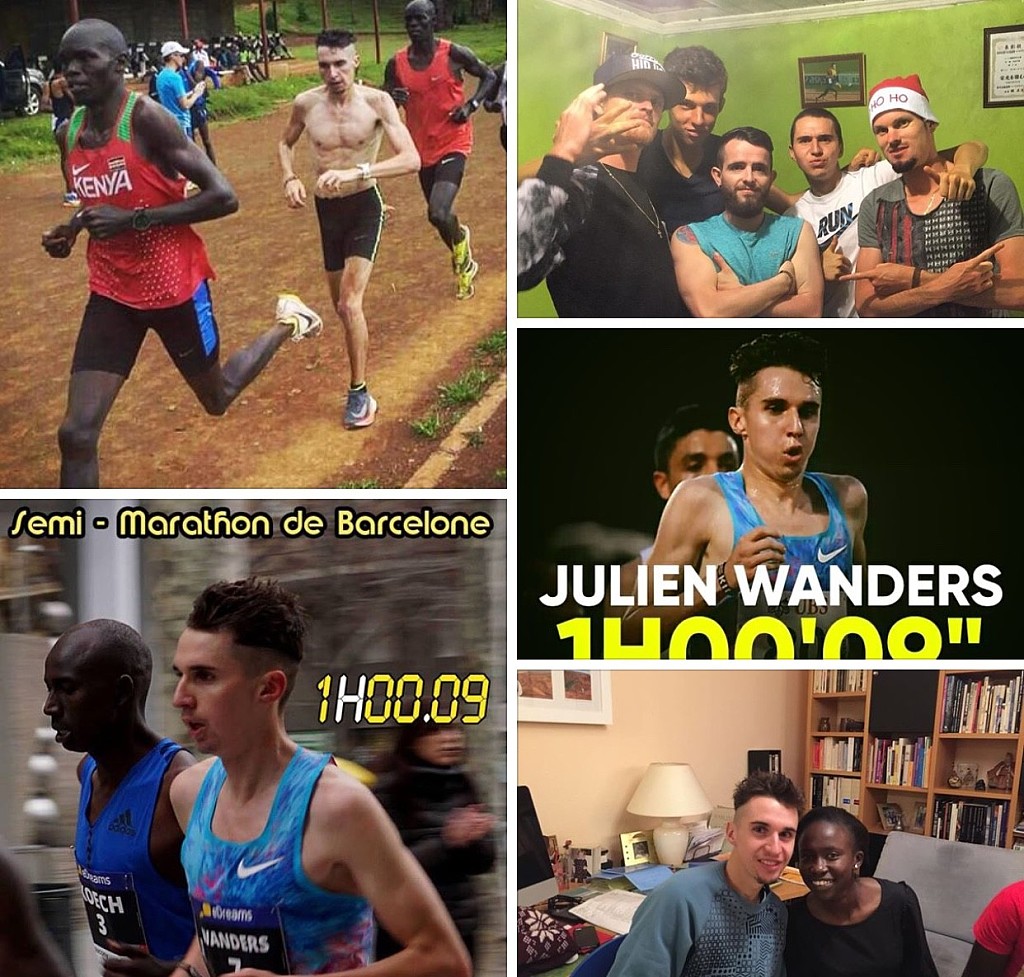Running News Daily
Running News Daily is edited by Bob Anderson. Send your news items to bob@mybestruns.com Advertising opportunities available. Train the Kenyan Way at KATA Kenya and Portugal owned and operated by Bob Anderson. Be sure to catch our movie A Long Run the movie KATA Running Camps and KATA Potato Farms - 31 now open in Kenya! https://kata.ke/
Index to Daily Posts · Sign Up For Updates · Run The World Feed
Articles tagged #ugali
Today's Running News
Potatoes: The Ideal Pre-Marathon Fuel?
For years, pasta has been the go-to pre-race meal for runners, but potatoes might just be the better choice—and here’s why:
1. Potatoes are a Complex Carbohydrate Powerhouse
A medium baked potato (~150g) offers approximately 37g of carbohydrates, primarily in the form of starch. This starch breaks down into glucose, the preferred fuel source for your muscles during endurance events. Unlike processed pasta, potatoes retain essential nutrients like potassium, iron, and magnesium, making them a natural choice.
2. Rich in Potassium and Electrolytes

Potassium plays a critical role in nerve function and muscle contraction. One medium potato delivers over 900mg of potassium—that’s nearly double the amount found in a banana (~450mg). This helps prevent cramping and supports muscle endurance during long races.
3. Lower Glycemic Load than Pasta
While pasta can cause a rapid spike in blood sugar, potatoes (especially when eaten with skins and balanced toppings like butter or cheese) have a lower glycemic load, resulting in a more sustained energy release.
4. Gentler on the Stomach
Many runners report that pasta causes bloating or discomfort due to gluten and higher fiber content. Potatoes—whether baked or mashed with simple toppings—are gentler on digestion, making them an excellent option for pre-race fueling.
5. Anecdotal Success (and Personal Endorsement)
Your own experience adds weight to the argument: a fully loaded baked potato (with butter, cream cheese, and chives) combines carbs, fats, and a touch of protein. This combination slows digestion and provides a steady energy release throughout a marathon.
Could Potatoes Replace Pasta for Pre-Race Carb-Loading?
Absolutely. Many elite runners in East Africa and beyond already favor starchy root vegetables like potatoes, sweet potatoes, and ugali over refined pasta. Potatoes offer a natural, nutrient-dense fuel source that supports endurance, performance, and recovery.
As more athletes turn to wholesome, performance-driven nutrition, it might be time to make potatoes your pre-marathon staple—and leave pasta on the sidelines.
by Boris Baron
Login to leave a comment
Kenya vs Ethiopia What Sets Their Runners Apart
When it comes to distance running, no two countries are more dominant—or more frequently compared—than Kenya and Ethiopia. From 5Ks to marathons, athletes from these East African nations consistently top podiums and rewrite record books. But while the results may look similar, the paths to victory are often quite different.
Altitude Advantage, Different Terrains
Both Kenya and Ethiopia benefit from high-altitude environments that naturally boost endurance. Kenya’s top training hubs, like Iten and Eldoret, sit between 7,000 and 8,000 feet. Ethiopia’s Bekoji and Sululta offer similar elevations. But terrain matters too: Kenya’s roads are often red clay or uneven gravel, ideal for building strength and resilience. Ethiopia’s runners more frequently train on hills and mountain trails, with steeper and more demanding climbs integrated into daily runs.
Training Philosophies Diverge
Kenyan training is rooted in simplicity and rhythm. Athletes often meet for large group sessions, with a strong focus on tempo runs, long-distance efforts, and unstructured fartleks. The vibe is community-oriented and competitive—if someone surges, the group follows.
In contrast, Ethiopia’s elite training tends to be more individualized and coach-driven. Athletes follow structured schedules with clearly defined paces, recovery sessions, and high-intensity track workouts. The approach is more scientific, and recovery days are strictly observed.
Daily Life and Recovery
Kenyan runners typically live together in camps, waking early to train, followed by long periods of rest. A second run often comes in the late afternoon, and the lifestyle emphasizes minimal distractions.
Ethiopian runners may train in smaller groups and return home between sessions. There’s more variety in how the day is structured, though the focus on discipline remains.
(Photos) Kenyan Training in Iten and Eldoret
1. Mass Training Run in Iten
A striking image capturing a large group of Kenyan runners during a typical morning session on the red dirt roads of Iten, known as the “Home of Champions.”
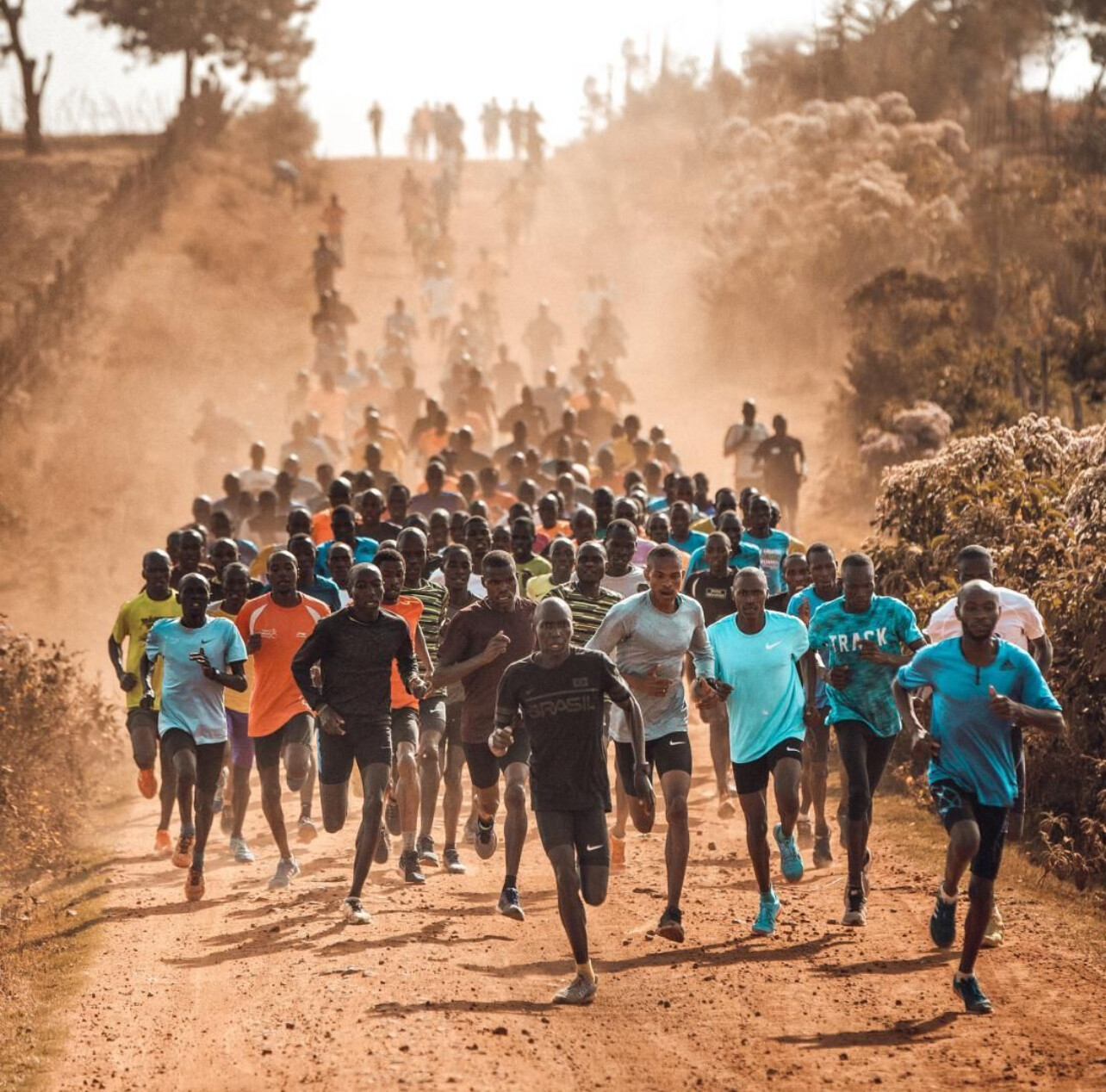
2. Track Workouts in Eldoret
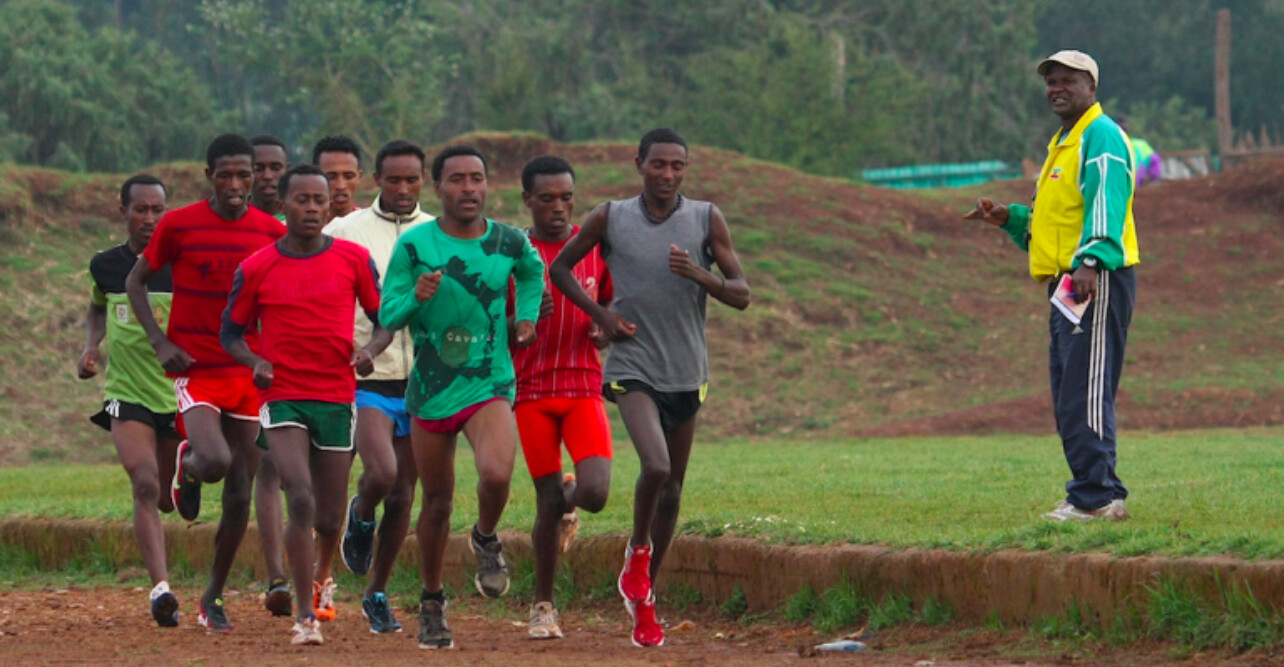
Kenyan marathon runners engaging in interval training at the athletics track in Eldoret, highlighting their emphasis on group cohesion and endurance.
(Photos) Ethiopian Training in Bekoji and Sululta
3. Group Training in Bekoji
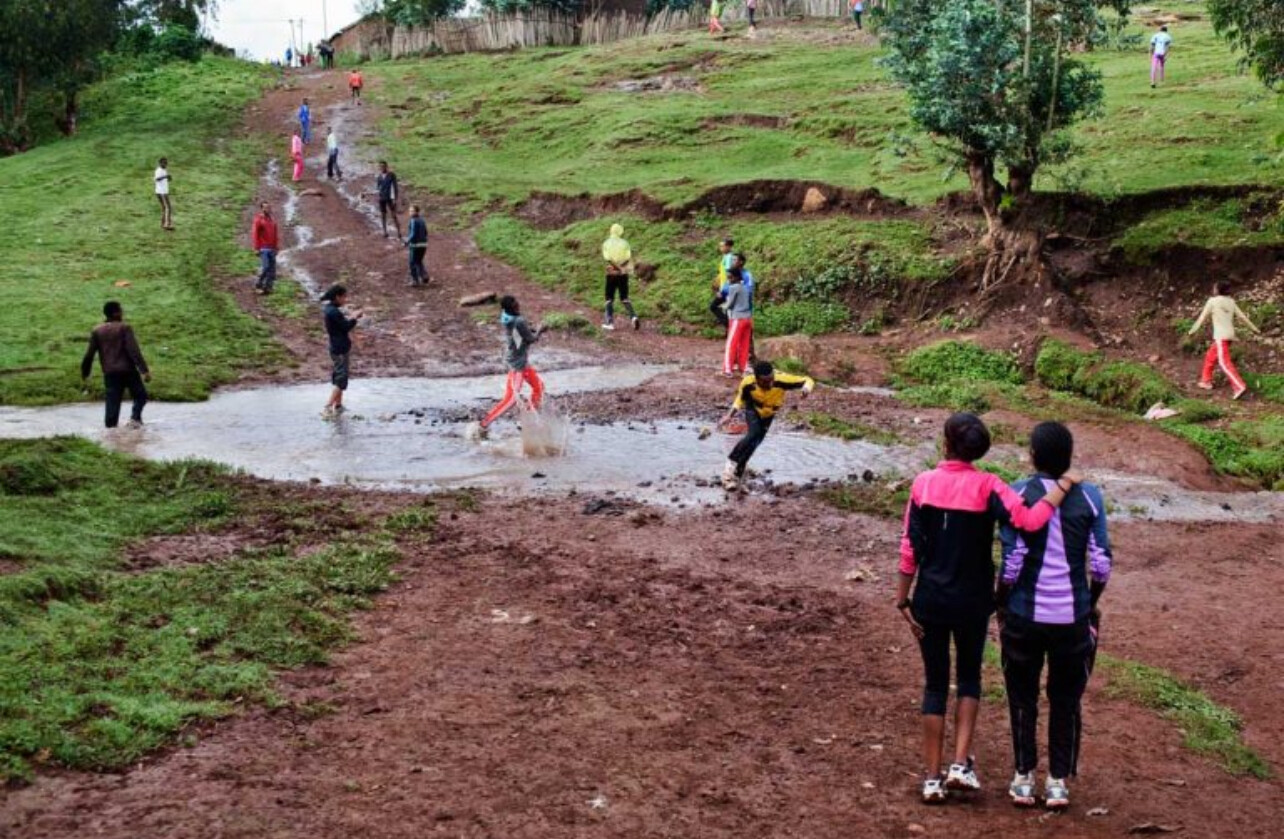
A glimpse into a training session in Bekoji, Ethiopia, showcasing runners on a dirt track, emphasizing their structured and coach-led routines.
4. Trail Running in Sululta
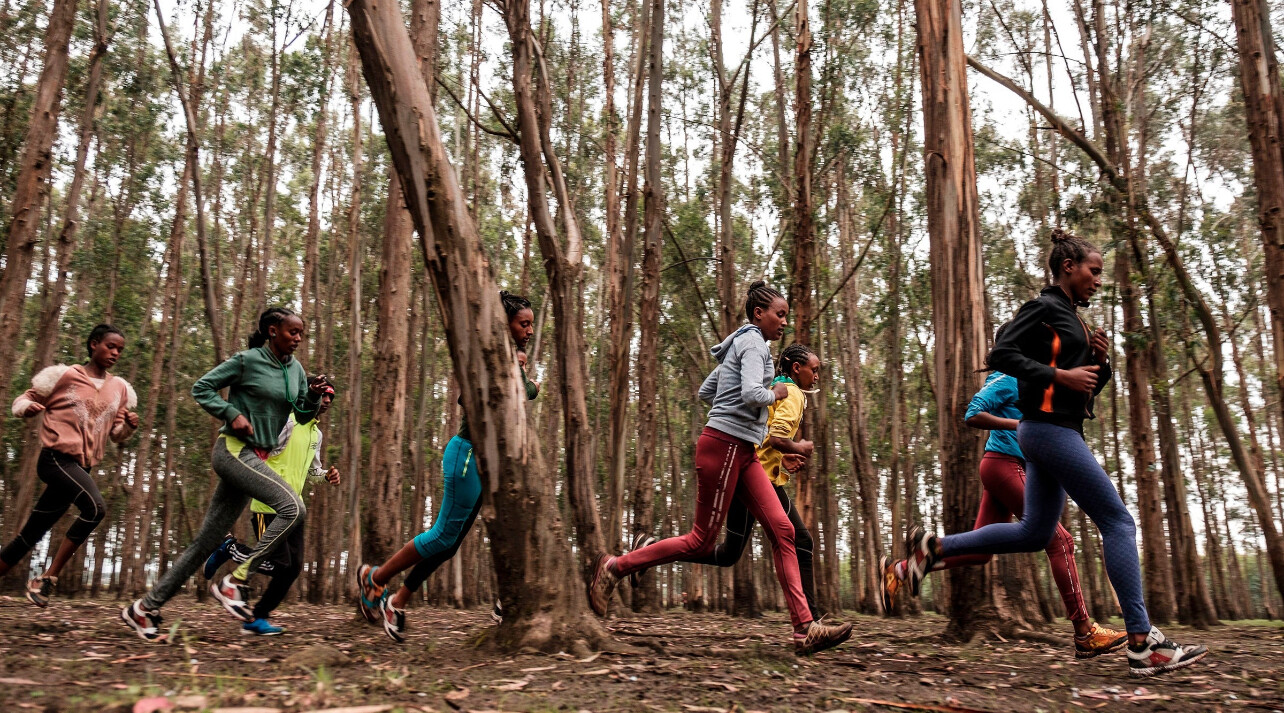
Ethiopian athletes navigating through forested trails in Sululta, reflecting their focus on varied terrains and natural environments.
Fueling for Success
Diet is another point of contrast. Kenyan athletes often eat ugali, a maize-based dish, with sukuma wiki (collard greens) and beans. Meals are consistent, simple, and heavy on carbohydrates. Hydration includes local teas and water, with little emphasis on supplements.
In Ethiopia, injera (a sour flatbread made from teff) is the foundation, served with protein-rich stews like shiro or doro wat. Teff is rich in iron and slow-digesting carbs—making it a valuable fuel for endurance.
Cultural and Coaching Influence
In Kenya, many athletes are inspired by runners from their own village or region—legends like Eliud Kipchoge or David Rudisha have inspired thousands. Training is often passed down through generations informally.
In Ethiopia, there’s a more centralized coaching system and support from the national federation. Greats like Haile Gebrselassie and Kenenisa Bekele have helped shape a more formal pathway from local clubs to the world stage.
Different Roads, Same Finish Line
Despite the differences, the results speak for themselves: both countries continue to dominate. Kenya may have the edge in the marathon, while Ethiopia consistently excels in 10K and track events. Together, they’ve redefined what’s possible in distance running.
by Boris Baron
Login to leave a comment
Recovery After the Marathon: Coach Jimmy Muindi’s Guide to Coming Back Strong
Coach Jimmy Muindi knows what it takes to go fast—and what it takes to recover. A world-class marathoner with a personal best of 2:07:50 (run in 2005), Muindi has competed at the highest level and now coaches runners at KATA Portugal (photo three and four). His approach to recovery is based on decades of elite training, racing, and learning what truly allows the body to rebuild.
According to Muindi, recovery is just as important as the buildup to a marathon. “If you don’t give your muscles and systems time to heal, you’re only going to dig yourself into a hole,” he says.
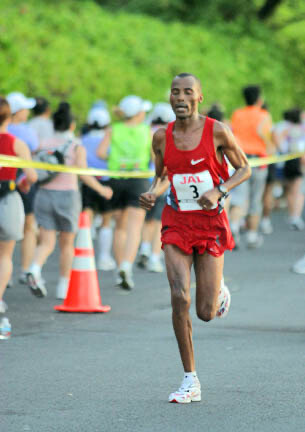
The 3-Week Elite Recovery Plan
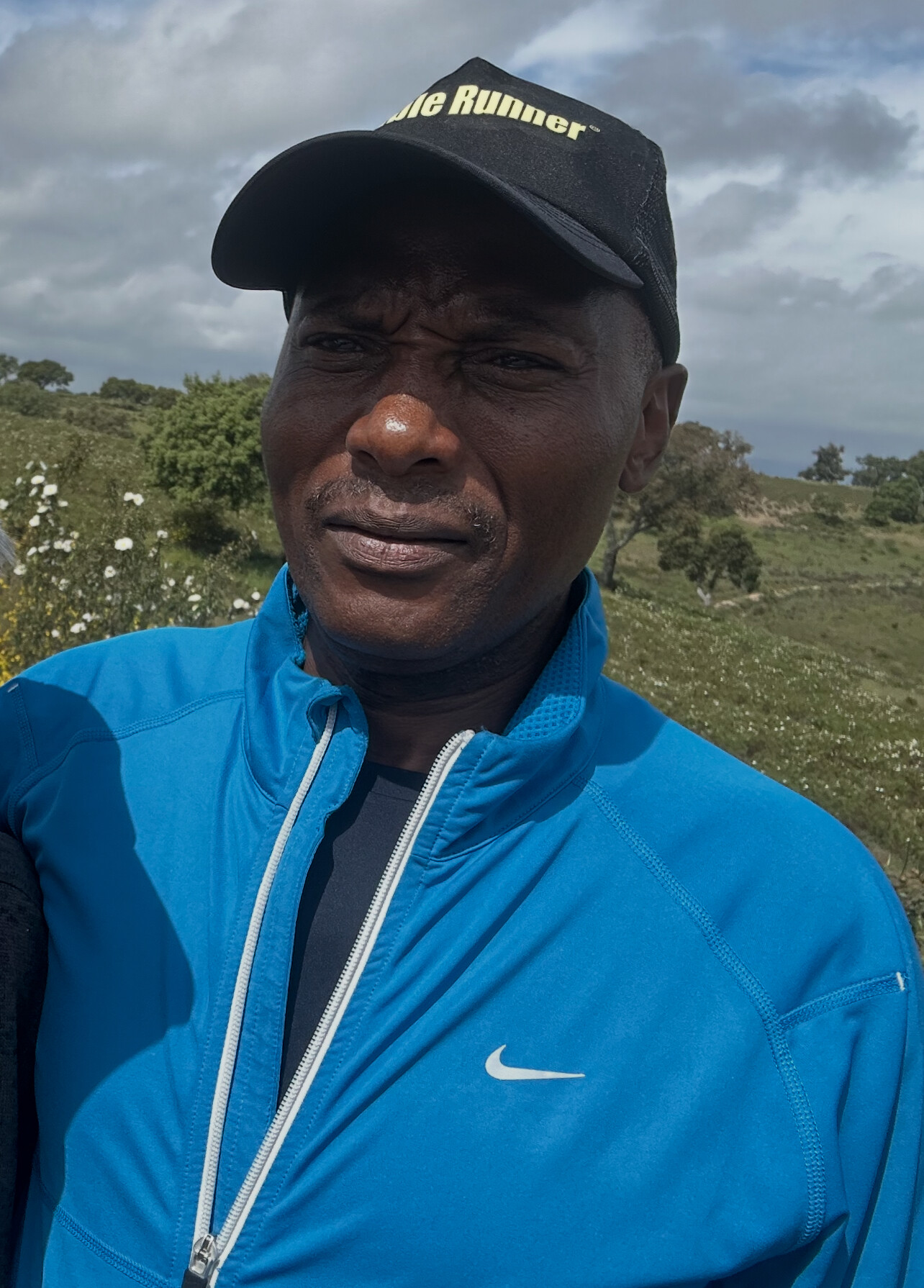
For elite runners—or anyone chasing their best possible performance—Muindi recommends a minimum of three weeks of focused recovery after a full marathon.
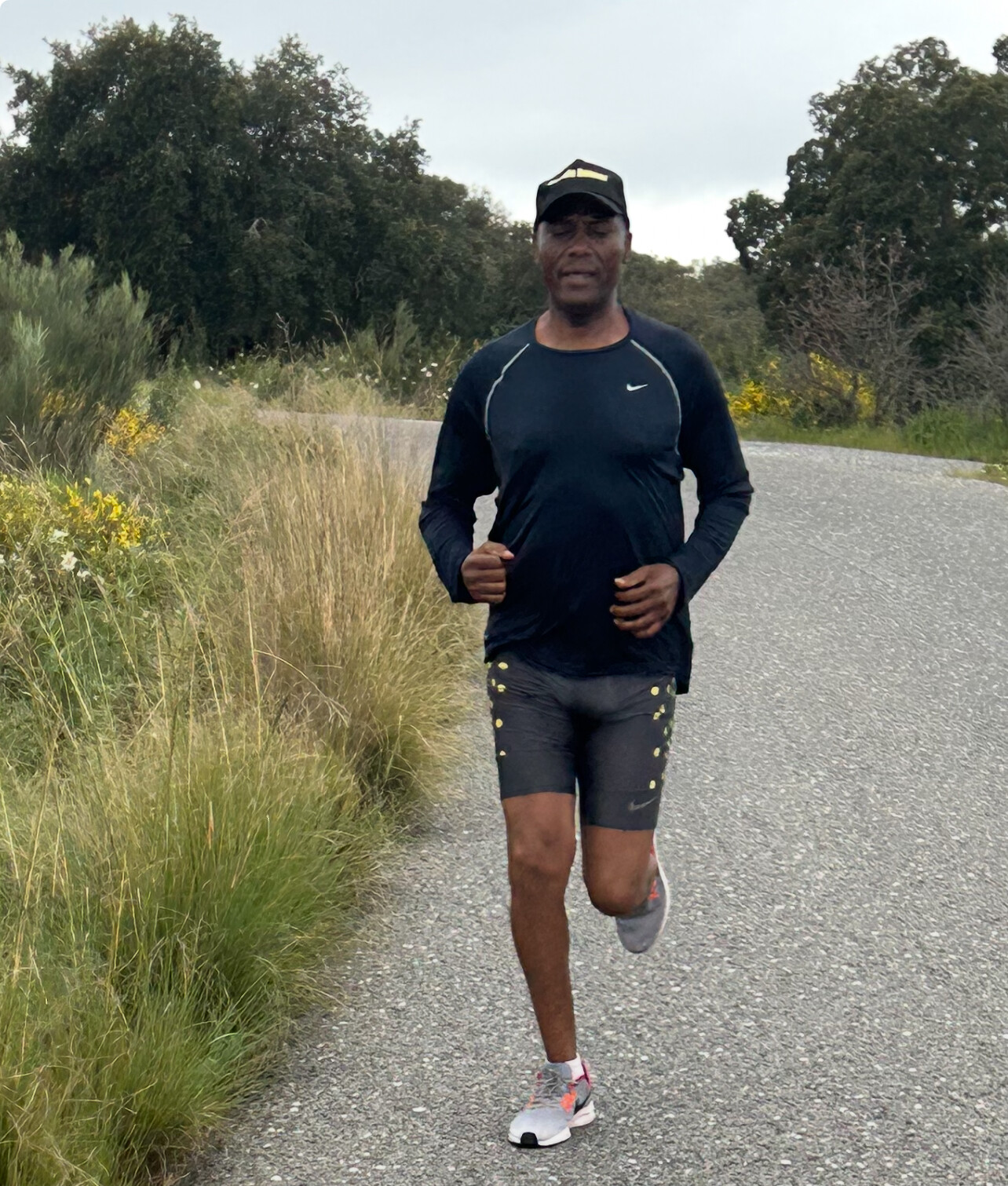
Week 1: Gentle Jogging
• Run 10K per day, very easy pace
• One run per day, no double sessions
• Take Sunday completely off
• No workouts, no long runs—just movement and blood flow
Week 2: Slight Build
• Run 10K to 15K per day, still easy and relaxed
• Continue listening to the body—no intensity yet
• Goal is to feel normal again, not to train
Nutrition Focus (Week 1 and Beyond):
• Bone marrow broth for joint and tissue recovery
• Plenty of fruit, including avocados, for healthy fats and micronutrients
• Complex carbs like bread and ugali (a Kenyan staple) to replenish energy stores
Week 3: Resume Light Training
• Start to reintroduce your normal training schedule, gradually
• No sharp intervals yet, but strides and rhythm-based runs are okay if body feels ready
Don’t Race Too Soon
Coach Muindi believes that your next serious marathon effort should be no sooner than four months after your last, especially if you gave a maximum effort.
“You can’t rush the process. You might feel good after a few weeks, but deep recovery takes time,” he explains.
Advice for the Average Runner
While most runners aren’t chasing sub-2:10 finishes, the principles still apply. Even recreational and club runners need at least one month of recovery after a marathon before considering hard training or racing again.
“Some people love to race often, and that’s okay if the goal is just to finish,” Muindi says. “But if you’re pushing for time, you’ve got to respect the distance—and your body.”
Read Your Body
Above all, Muindi emphasizes the importance of self-awareness:
“The bottom line is this: the body does have limits. You must listen to your body before you race again—at any distance. Just because someone else is racing doesn’t mean you should. Know yourself.”
Coach Muindi’s approach is grounded in experience, not just theory. He’s walked the path, and now he’s helping others walk—and run—it wisely.
by Boris Baron
Login to leave a comment
The Fueling Strategy of a Champion—Jimmy Muindi’s Approach to Nutrition and Race Preparation - Part three
In Parts One and Two, we explored Jimmy Muindi’s remarkable journey from a young barefoot runner to an elite marathoner, and his transition into coaching at the Kenyan Athletics Training Academy (KATA) in Portugal (all photos taken at KATA located at Anderson Manor Retreat in Monforte da Beira Portugal). Now, in Part Three, we delve into a critical element of running success—nutrition and hydration.
Training alone isn’t enough to maximize performance. Proper fueling and strategic race preparation play a major role in an athlete’s ability to perform at their best. Muindi has learned firsthand, through years of competing at the highest level, that what and when you eat can make or break a race.
At KATA Portugal, Muindi applies these same principles to his coaching, ensuring that runners understand not just how to train, but also how to eat and hydrate for peak performance.
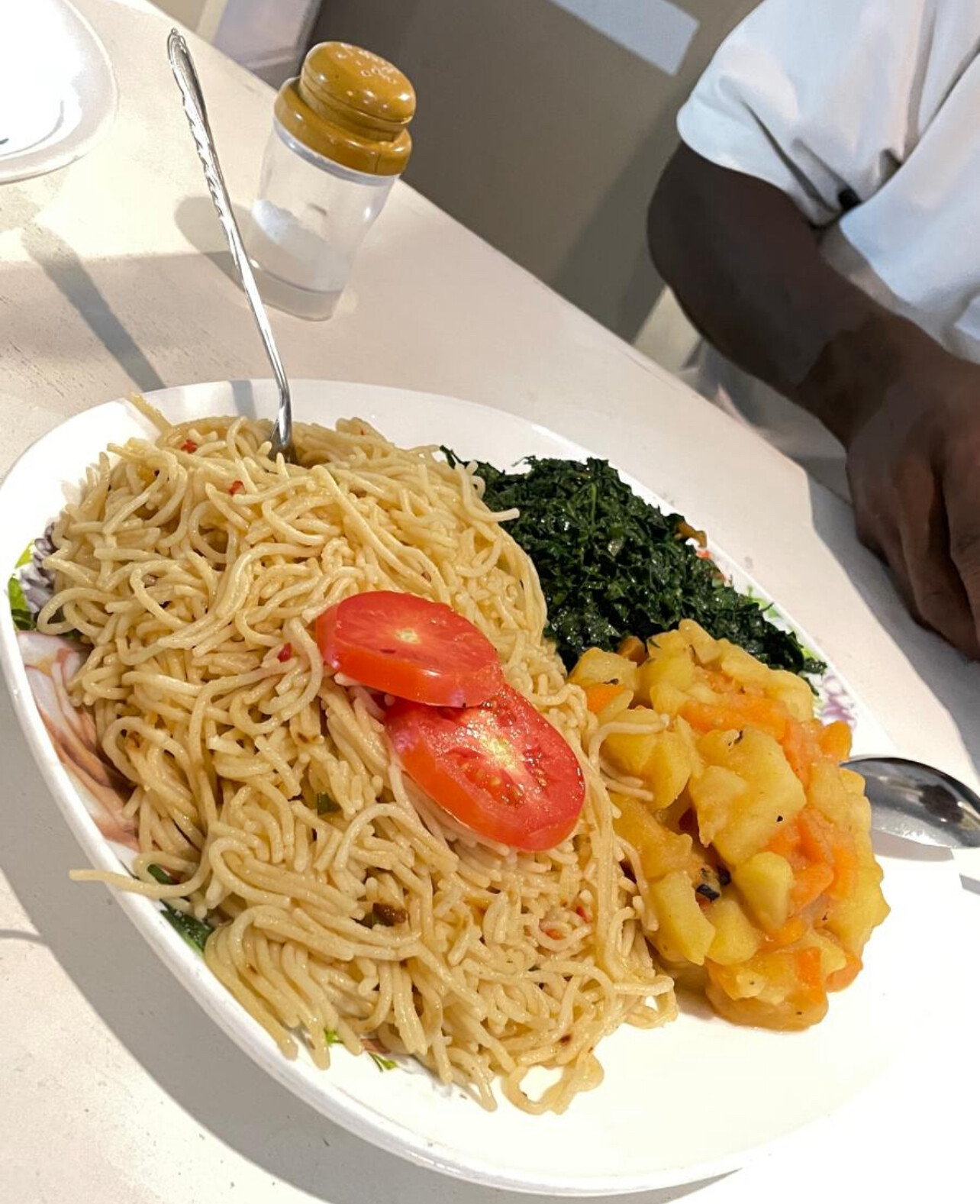
The Key to Fueling: Why Two Nights Before the Race Matters Most
Many runners focus on carb-loading the night before a race, but Muindi emphasizes that the most important meal happens two nights before the race.
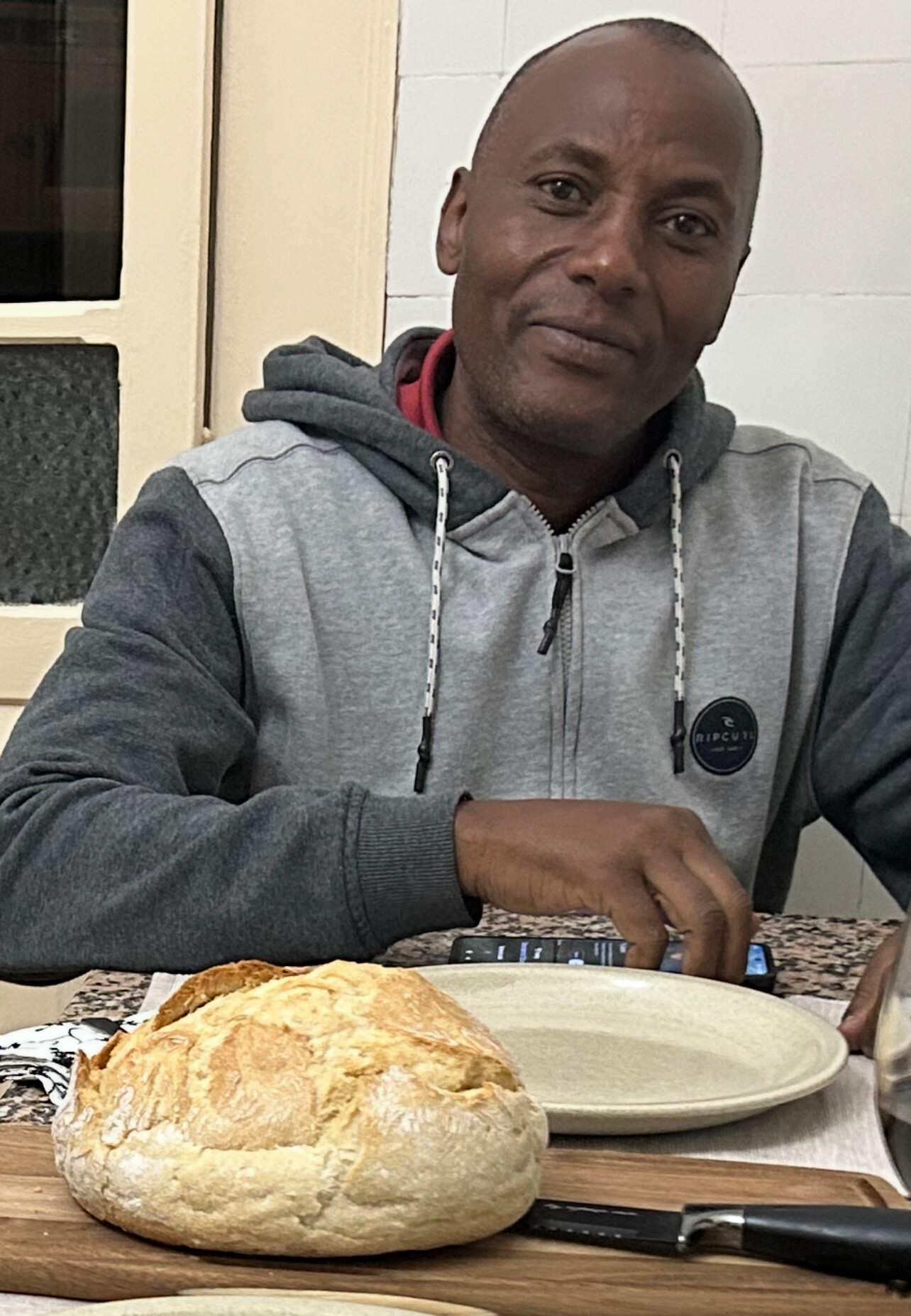
“If you eat too much the night before, your body doesn’t have enough time to fully process and store the energy properly,” Muindi explains. “Instead, it’s two nights before when you need to eat your biggest meal. That’s when your body is in the best position to absorb the nutrients and store glycogen for race day.”
This strategy is a hallmark of elite Kenyan runners. While they do eat a balanced meal the night before, it’s more about maintaining energy stores rather than overloading.
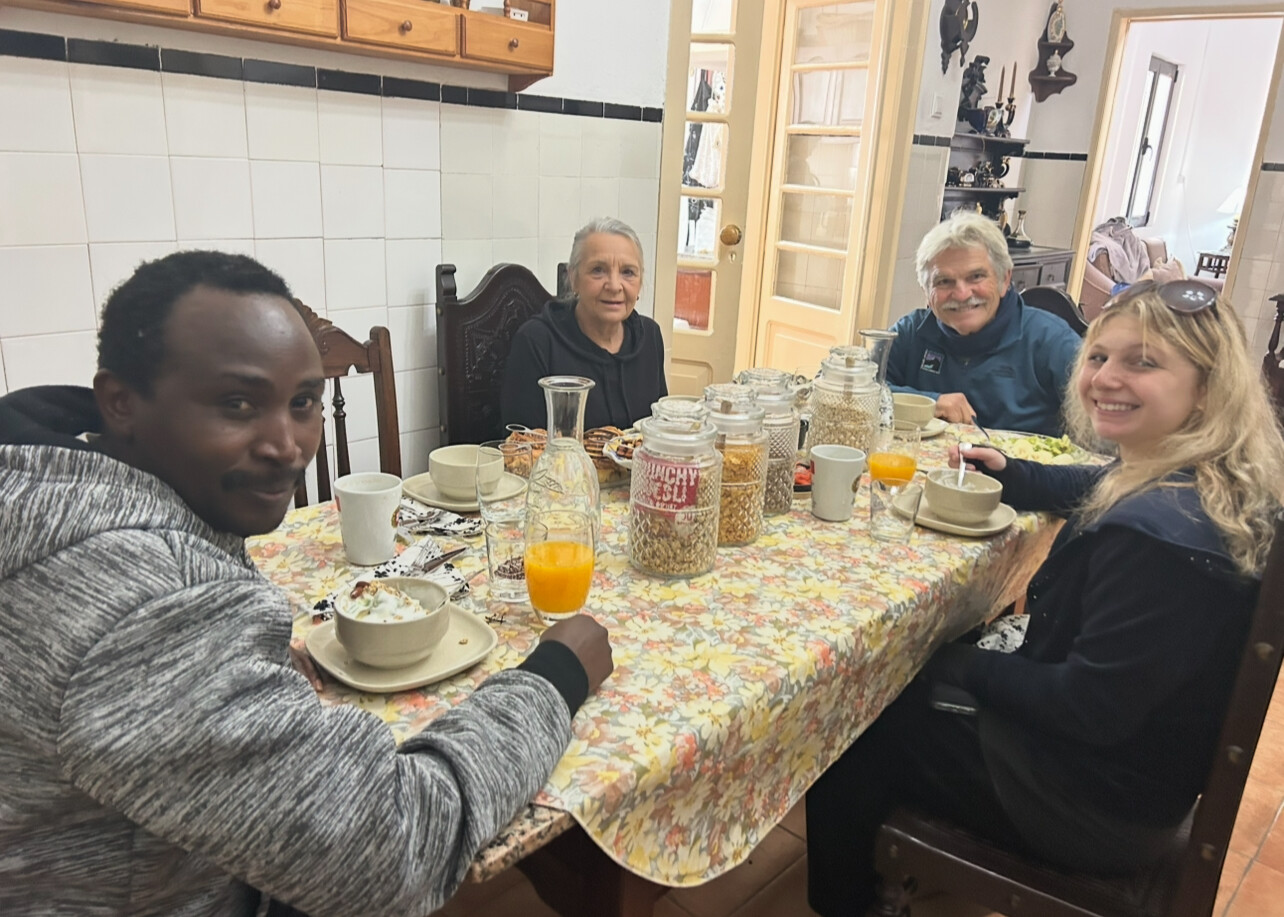
The Kenyan Runner’s Diet: Simple, Natural, and Effective
For decades, Kenyan distance runners have followed a diet that is both simple and highly effective. Muindi is no exception.
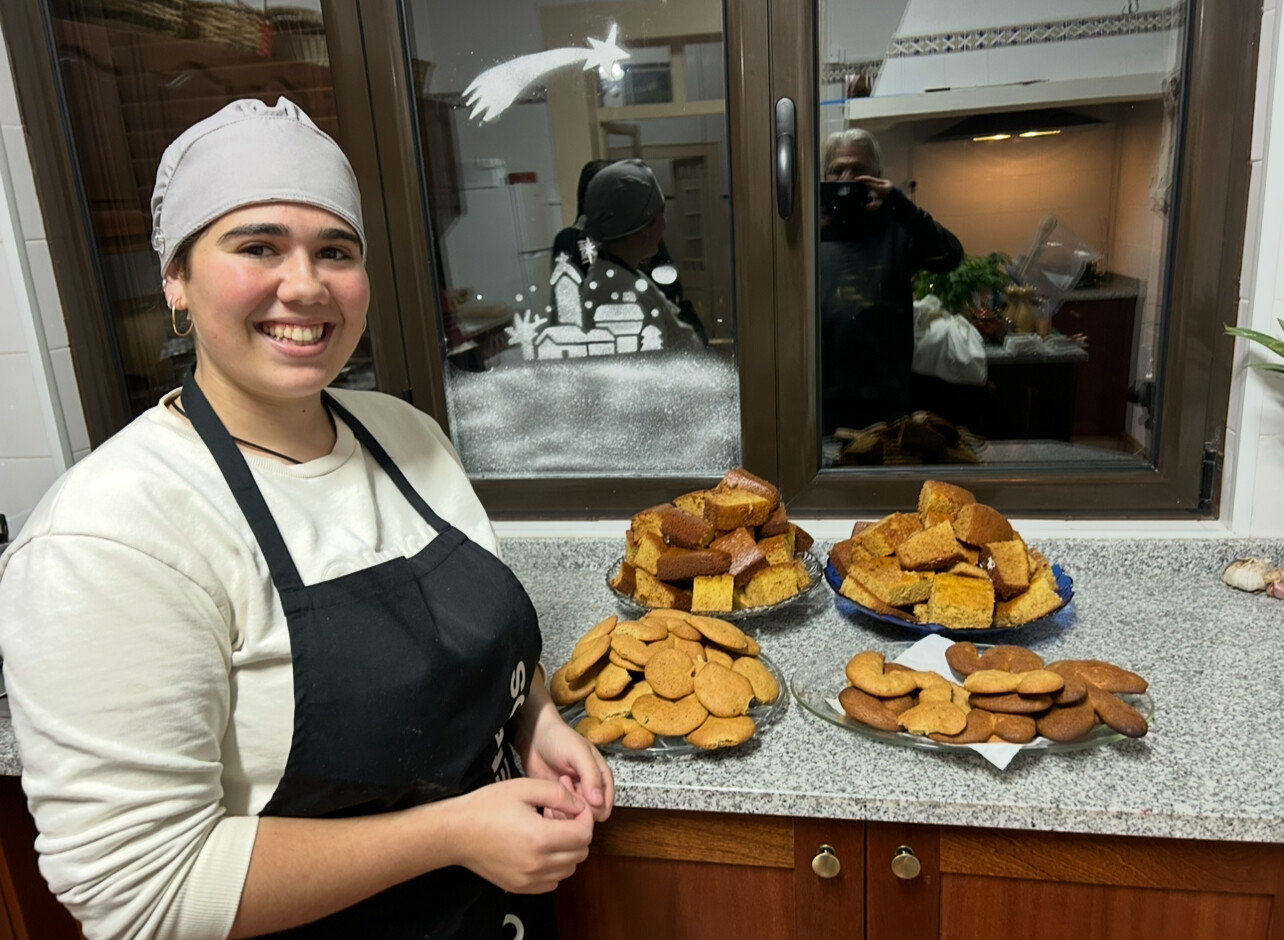
At the core of this diet are:
• Carbohydrates (about 75-80% of daily intake)– Ugali (a maize-based staple), rice, and potatoes provide the primary energy sources.
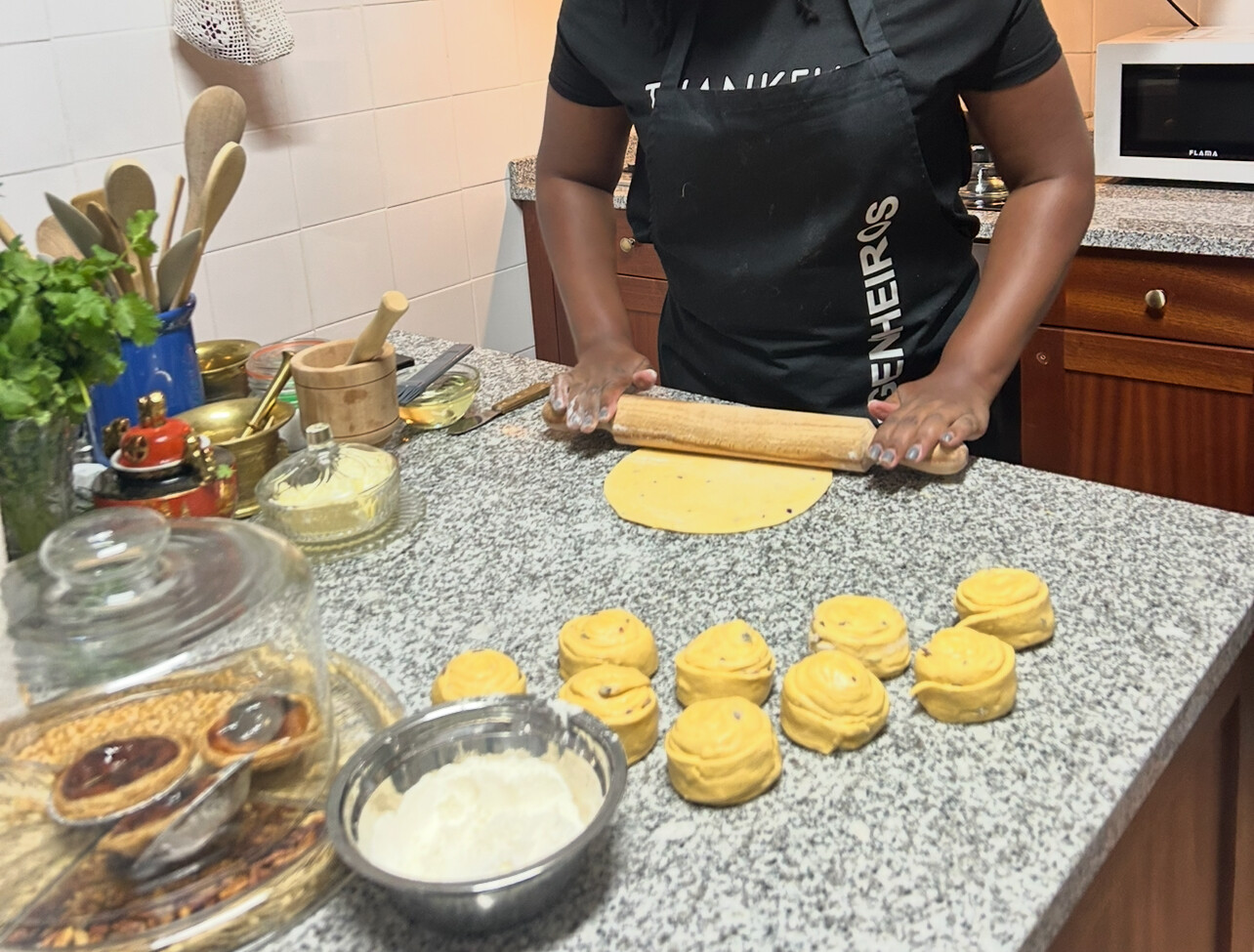
• Vegetables– Greens such as sukuma wiki (collard greens), spinach, and cabbage are common.
• Proteins (about 10-15%)– Beans, lentils, eggs, and occasionally meat (usually chicken, goat, or beef, but not in excess).

• Healthy fats– Avocados, nuts, and milk from cows or goats.
• Tea with milk and sugar– This is an important part of a Kenyan runner’s daily routine. Tea is consumed multiple times a day, often before and after training sessions. The combination of milk and sugar provides quick energy while keeping hydration levels up.
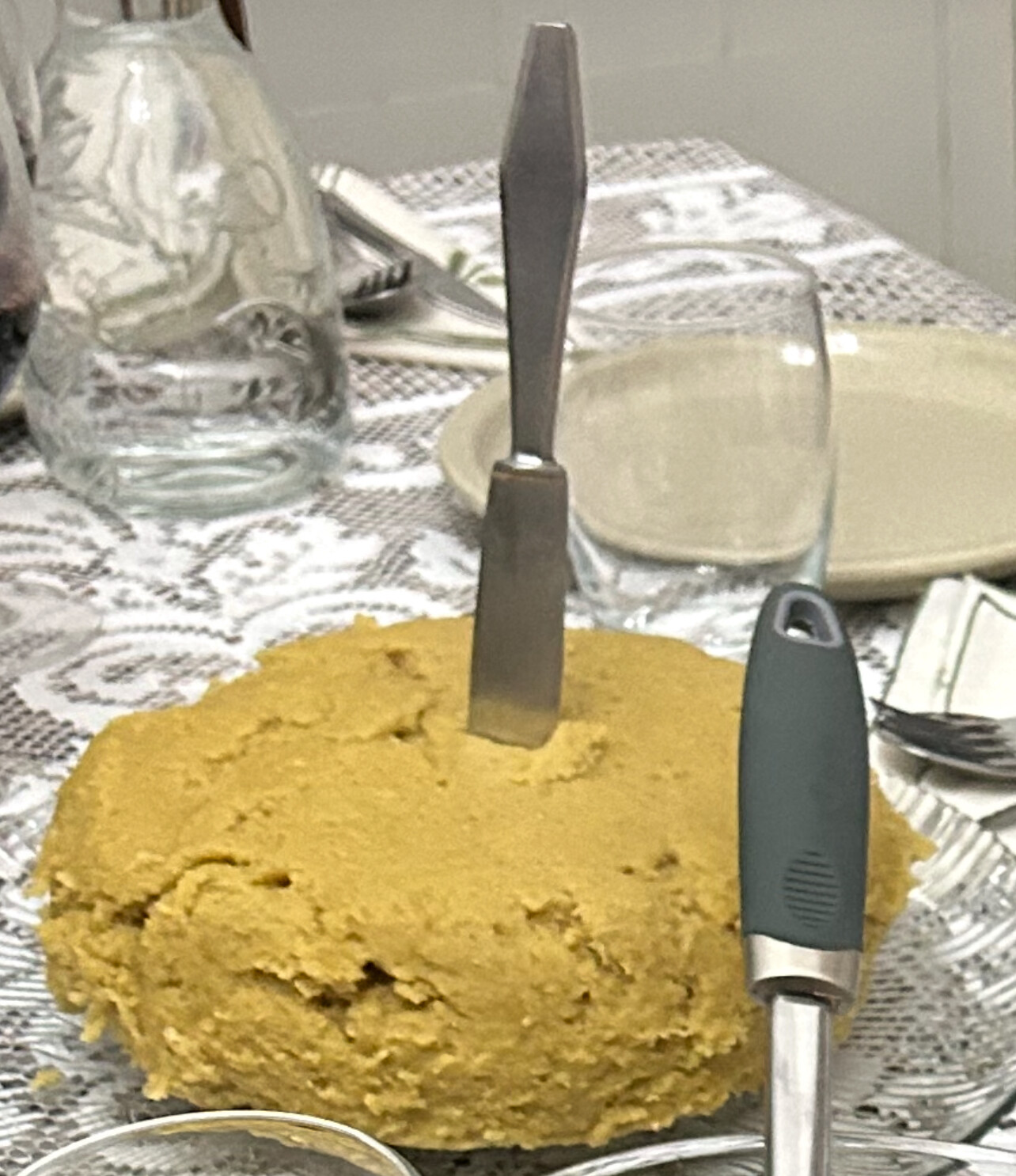
What’s notably absent from the traditional Kenyan diet is excessive processed foods. While sugar is used in tea, highly refined snacks and artificial ingredients are avoided. Instead, the focus is on whole, home-cooked meals with natural ingredients.
Pre-Race Nutrition Strategy
Muindi breaks his pre-race nutrition plan into three key phases:
1. Two Nights Before the Race – The Most Important Meal
• Large serving of ugali or rice for carbohydrates
• Protein source (beans, lentils, or chicken)
• Cooked greens for vitamins and minerals
• Hydration: Water and tea with milk and sugar
2. The Night Before the Race – Keeping It Light
• A smaller portion of carbohydrates (usually rice)
• Light vegetables
• Minimal protein (to avoid digestion issues the next morning)
• Hydration: Water, tea with milk and sugar, no heavy or fatty foods
3. Race Day Morning – Quick, Easily Digestible Energy
• A slice of bread with honey
• A banana for quick energy
• Black tea or tea with milk and sugar
• No heavy meals—just enough to keep energy levels stable without causing stomach discomfort
Hydration Strategy: Timing Matters
Muindi's approach to hydration during a marathon is disciplined and strategic. Unlike recreational runners who may sip water frequently, he does not take any water until after the 5K mark. From that point onward, he drinks water every 5K, adjusting based on weather conditions.
“For me, being out there for just over two hours, I don’t need to drink too much,” Muindi explains. “I know my body, and I hydrate well before the race, so I only take small amounts of water every 5K.”
However, Muindi acknowledges that this approach isn’t suitable for everyone.
“If you are running at a four-hour pace or longer, your hydration needs change. For runners expecting to be on the course for four, six, or even eight hours, regular hydration is critical. In these cases, you need to take in more fluids and also consume calories—things like bananas or energy gels—to maintain energy levels.”
Muindi emphasizes that each runner should plan their hydration strategy according to their race pace, experience, and the race-day conditions.
At KATA Portugal, Muindi teaches runners how to fine-tune their hydration plans so they don’t overhydrate but also don’t risk dehydration. He helps runners determine when and how much to drink based on their training intensity and expected race time, ensuring they develop an optimal balance of water intake, electrolyte replenishment, and fuel consumption.
Collaborative Coaching at KATA Portugal
Muindi works closely with Bob Anderson, a lifetime runner and the founder of KATA. Anderson, who started Runner’s World magazine in 1966 at the age of 17, has dedicated his life to the sport of running. His passion led him to establish KATA in Kenya in 2019, and subsequently, KATA Portugal in 2024. Anderson and his wife, Catherine, spend approximately 45% of their time at KATA, actively engaging with the running community and supporting the academy’s mission.
The academy ensures that there is always a certified Kenyan coach available, providing authentic training experiences rooted in Kenyan running culture. This collaborative environment fosters a holistic approach to training, combining Muindi’s expertise with the rich traditions of Kenyan athletics.
Beyond Running: A Retreat for All
KATA offers more than just a running camp. It also caters to hikers, walkers, and individuals seeking relaxation and a respite from the hectic world. Nestled in the village of Monforte da Beira in central Portugal, with a population of just 310 people, KATA provides the quiet environment that many people seek. This tranquil setting allows guests to unwind, explore scenic trails, and immerse themselves in the local culture, making it an ideal destination for both active and leisure pursuits.
How Muindi Teaches Nutrition at KATA Portugal
At KATA Portugal, Muindi ensures that guests learn by doing. The training program isn’t just about running—it’s also about understanding how to fuel like a champion.
• Meals at KATA Portugal follow the same principles as the Kenyan elite training camps. Guests experience a diet that emphasizes complex carbohydrates, natural proteins, and proper hydration.
• Workshops and discussions provides insight into meal timing, nutrient absorption, and the importance of eating for recovery.
• Pre-race meal planning helps runners adjust their own routines based on what has worked for world-class marathoners.
One of the most valuable lessons Muindi imparts is that nutrition is about consistency, not last-minute changes. Runners at KATA Portugal learn how to eat for performance long before race week, making proper fueling a habit rather than a stress factor.
by Boris Baron
Login to leave a comment
Record-breaker's diet: Beatrice Chebet reveals what she eats to fuel her to world records and gold medals
Double Olympics champion Beatrice Chebet is basking in the glory of yet another world record following her heroics in Barcelona but what does she eat to fuel her to success?
Beatrice Chebet is among the athletes who had a fantastic 2024 season when she won two Olympics titles and broke world records.
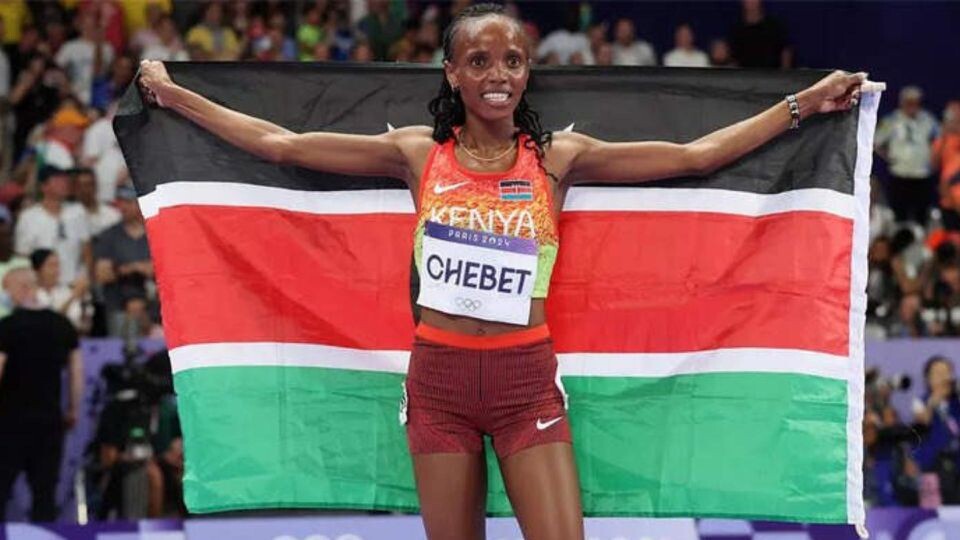
Chebet signed off the year in style as she smashed the 5km world record by running 13:54, to shave 19 seconds off the previous mark, at the Cursa dels Nassos in Barcelona on New Year’s eve.
It was a great way to end a year that was filled with so much success for her, having started by defending her World Cross Country title, before smashing the 10,000m world record at the Prefontaine Classic in May.
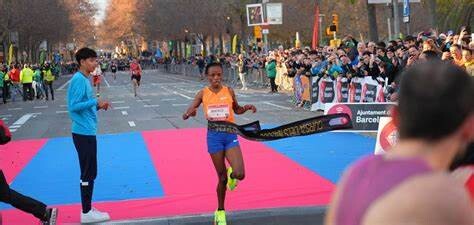
Chebet would then go on to win two Olympics gold medals in Paris, claiming the 5,000m and 10,000m titles before adding the Diamond League crown.
Having such a remarkable season needs good preparations and for Chebet what she eats matters a lot because it is what fuels her to success.
The 24-year-old keeps it simple when it comes to diet and sticks to Kenyan delicacies which have served her quite well going by her achievements on the track.
“I like ugali because it has energy and after training, I have to eat it,” Chebet told NTV just days before her record-breaking feat in Barcelona.
“I also love white meat and chapati is also my favourite. Milk is also good, mursik [fermented milk that is a staple for the Kalenjin community] is a good accompaniment for ugali.
“Generally, I eat everything as long as my body does not react to it because at the end of it, I do a lot of training.”
Like most of her Kenyan peers, Chebet sticks to what she knows and grew up eating, resisting the allure of trying out new things.
As she starts 2025, more glory is expected from her with the success of 2024 increasing pressure to do the same, or even better, this year especially at the World Championships in Tokyo, Japan in September.
by Joel Omotto
Login to leave a comment
Elvis Cheboi Aiming to Win TCS Toronto Waterfront Marathon for Second Time
Much was expected of Kenya’s Elvis Cheboi when he arrived in Toronto last year for the TCS Toronto Waterfront Marathon. He did not disappoint.
Crossing the finish line first to claim the $20,000 winner’s prize he beat several international athletes who have run two to three minutes faster than his winning time of 2:09:20.
By today’s standards his personal best is not a quick time. But a victory at this World Athletics Elite Label Race against a terrific field - and by over a minute - has
increased his prowess in the sport. Now he returns to Toronto hoping for favourable conditions and a world-class field where he can also run a time more representative of his ability.
Indeed, he ran a personal best of 59:15 at the 2022 Barcelona Half Marathon indicating he might be capable of a time closer to the Toronto Waterfront course record of 2:05:00 held by his countryman, Philemon Rono (2019).
Winning Toronto was a milestone in his career nonetheless.
"That (Toronto) race made me a great memory because I had never won a marathon or any race abroad,” he says from his living room in Kenya. “So it was memorable. That was my second marathon race and I won it.”
As he speaks, his two children - daughter Shaline, 6, and son Shalom, 2 - are watching a television program and he instructs them to lower the volume. Then he smiles.
“Tomorrow the small boy is two years old,” he reveals laughing. “There is a cake here. He is still young so doesn’t know it’s a birthday but I will sing ‘Happy Birthday’to him.”
Family is of the utmost importance and running, in order to earn money is a priority. Yet, Cheboi has not raced since Toronto.
He and his management team at Demadonna Athletics Promotion had him lined up to race in the Vienna Marathon this past April. But he had slight issues with both his hamstrings which interrupted his buildup. So the decision was made by him and his coach, Gabriele Nicola, to put all their energies into having him fully prepared for a Toronto Waterfront Marathon title defence.
For many years now Cheboi has lived in Mororia which is about three kilometres from the famed ‘running town’ of Iten. A local hotel serves as the Demadonna team camp and houses several of the twelve strong marathon training group during the week. They go home on weekends. But, since Cheboi has a young family, it was felt
it was better for him to drive in for the training sessions and for massage therapy three times a week.
Several of his training partners have run much faster than Cheboi’s best - led by Philemon Kiplimo (2:04:56) - so he is benefiting from being in such a talented group.
Like most Kenyan runners he sees his running profession as a means for a brighter future for himself and his young family. He maintains a farm where he grows maize which is used to make the Kenyan staple, ugali. He also plants wheat and potatoes while keeping goats, sheep and cattle. It’s an exhausting lifestyle and so he has enlisted help from family members.
“Yes I have help with my farm. My relatives help; my brother and also my parents,” he reveals adding he doesn’t expect to rely on farming after he retires from competition.
"God willing, I will not depend on the farm only. I think I will also find another way.
Somehow I will do another thing.”
Several times during the video call from Canada he thanks the caller for taking interest and expresses his gratitude for being invited back to Toronto Waterfront Marathon.
“I’m looking forward to coming back to Toronto very much. Yes,” he declares.
“Firstly, I want to thank the organizers for inviting me back. I think I will try to win for the second time but I can’t promise.
“The good weather on the day will determine if I can run my best time.”
by Paul Gains
Login to leave a comment
24 Hours with One of the World’s Best Marathoners
As the 2023 Boston Marathon winner and Olympian Hellen Obiri puts final touches on her build for the NYC Marathon, she’s aiming to become the seventh woman ever to win two majors in one year
Four weeks out from competing in the 2023 New York City Marathon, one of the world’s most prestigious road races, an alarm clock gently buzzes, signaling the start of the day for 33-year-old Hellen Obiri.
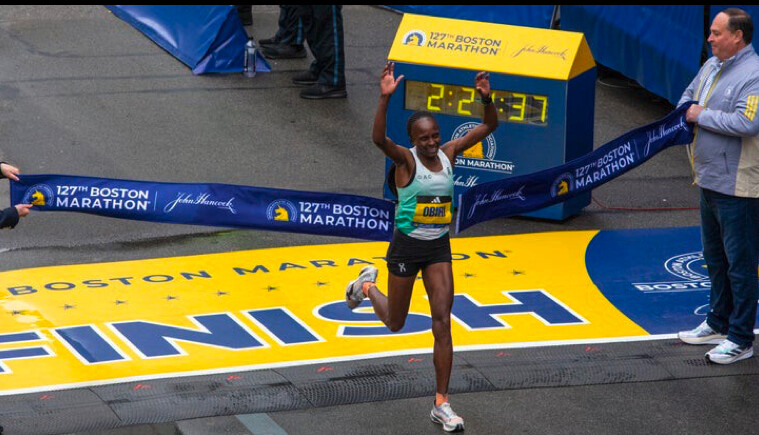
Despite having rested for nearly nine hours, Obiri, a two-time world champion from Kenya, says the alarm is necessary, otherwise she can oversleep. This morning’s training session of 12 miles at an easy pace is the first of two workouts on her schedule for the day as she prepares for the New York City Marathon on November 5.
The race will be her third attempt in the distance since she graduated from a successful track career and transitioned into road racing in 2022. Obiri placed sixth at her marathon debut in New York last November, finishing in 2:25:49.
“I was not going there to win. I was there to participate and to learn,” she says, adding that the experience taught her to be patient with the distance. This time around in New York, she wants to claim the title.
Obiri drinks two glasses of water, but she hasn’t eaten anything by the time she steps outside of her two-bedroom apartment in the Gunbarrel neighborhood of Boulder, Colorado.
In September 2022, the three-time Olympian moved nearly 9,000 miles from her home in the Ngong Hills, on the outskirts of Nairobi, Kenya, to Colorado. She wanted to pursue her marathon ambitions under the guidance of coach and three-time Olympian Dathan Ritzenhein, who is the fourth-fastest U.S. marathoner in history. Ritzenhein retired from professional running in 2020 and now oversees the Boulder-based On Athletics Club (OAC), a group of elite professional distance runners supported by Swiss sportswear company On.
Obiri, who was previously sponsored by Nike for 12 years before she signed a deal with On in 2022, said that moving across the world wasn’t a difficult decision. “It’s a great opportunity. Since I came here, I’ve been improving so well in road races.”
In April, Obiri won the Boston Marathon. It was only her second effort in the distance, and the victory has continued to fuel her momentum for other major goals that include aiming for gold at the 2024 Paris Olympics and also running the six most competitive and prestigious marathons in the world, known as the World Marathon Majors.
Obiri says goodbye to her eight-year-old daughter Tania and gets into a car to drive six miles to Lefthand trailhead, where she runs on dirt five days a week. She will train on an empty stomach, which she prefers for runs that are less than 15 miles. Once, she ate two slices of bread 40 minutes before a 21-mile run and was bothered by side stitches throughout the workout. Now, she is exceptionally careful about her fueling habits.
Three runners stretch next to their cars as Obiri clicks a watch on her right wrist and begins to shuffle her feet. Her warmup is purposely slow. In this part of Colorado, at 5,400 feet, the 48-degree air feels frostier and deserving of gloves, but Obiri runs without her hands covered. She is dressed in a thin olive-colored jacket, long black tights, and a black pair of unreleased On shoes.
Obiri’s feet clap against a long dirt road flanked by farmland that is dotted with horses and a few donkeys. Her breath is hardly audible as she escalates her rhythm to an average pace of six minutes and 14 seconds per mile. This run adds to her weekly program of 124 miles—some days, she runs twice. The cadence this morning is hardly tough on her lungs as she runs with her mouth closed, eyes intently staring ahead at the cotton-candy pink sunrise.
“Beautiful,” Obiri says.
Her body navigates each turn as though on autopilot. Obiri runs alone on easy days like today, but for harder sessions, up to four pacers will join her.
“They help me to get the rhythm of speed,” Obiri says. For longer runs exceeding 15 miles, Ritzenhein will bike alongside Obiri to manage her hydration needs, handing her bottles of Maurten at three-mile increments.
After an hour, Obiri wipes minimal sweat glistening on her forehead. Her breathing is steady, and her face appears as fresh as when she began the run. She does not stretch before getting into the car to return home.
The remainder of the morning is routine: a shower followed by a breakfast of bread, Weetabix cereal biscuits, a banana, and Kenyan chai—a mix of milk, black tea, and sugar. She likes to drink up to four cups of chai throughout the day, making the concoction with tea leaves gifted from fellow Kenyan athletes she sees at races.
Then, she will nap, sometimes just for 30 minutes, and other times upwards of two hours. “The most important thing is sleeping,” Obiri says. “When I go to my second run [of the day], I feel my body is fresh to do the workout. If I don’t sleep, I feel a lot of fatigue from the morning run.”
Obiri prepares lunch. Normally she eats at noon, but today her schedule is busier than usual. She cooks rice, broccoli, beets, carrots, and cabbage mixed with peanuts. Sometimes she makes chapati, a type of Indian flatbread commonly eaten in Kenya, or else she eats beans with rice.
The diet is typical among elite Kenyan athletes, and she hasn’t changed her eating habits since moving to the U.S. Obiri discovered a grocery store in Denver that offers African products, so she stocks up on ingredients like ground corn flour, which she uses to make ugali, a dense porridge and staple dish in many East African countries. She is still working through 20 pounds of flour she bought in June.
Obiri receives an hour massage, part of her routine in the early afternoon, three times a week. Usually the session is at the hands of a local physiotherapist, but sometimes Austin-based physiotherapist Kiplimo Chemirmir will fly in for a few days. Chemirmir, a former elite runner from Kenya, practices what he refers to as “Kenthaichi massage,” an aggressive technique that involves stretching muscles in short intervals.
Ritzenhein modifies Obiri’s training schedule, omitting her afternoon six-mile run so she can rest for the remainder of the day and reset for a speed workout tomorrow morning. Last fall, he took over training Obiri, who was previously coached by her agent Ricky Simms, who represented Jamaican sprinter Usain Bolt, an eight-time gold medalist and world record holder, and British long distance runner Mo Farah, a four-time Olympic gold medalist.
Ritzenhein has programmed Obiri’s progression into the marathon with more volume and strength training. The meticulous preparation is essential to avoid the aftermath of her marathon debut in New York City last fall, when she was escorted off the course in a wheelchair after lacking a calculated fueling and hydration strategy. Obiri had averaged running 5:33-minute miles on a hilly route that is considered to be one of the most difficult of all the world marathon major races.
“It’s a real racing race. You have to make the right moves; you have to understand the course,” Ritzenhein says of the New York City Marathon. “We’ve changed some things in training to be a little more prepared. We’ve been going to Magnolia Road, which is a very famous place from running lore—high altitude, very hilly. We’ve been doing some long runs up there. In general, she’s got many more 35 and 40K [21 and 24 miles] runs than she had before New York last year.”
In New York, Obiri is aiming to keep pace alongside a decorated elite field that will include Olympic gold medalist Peres Jepchirchir, former women’s marathon world record holder Brigid Kosgei, and defending New York Marathon champion Sharon Lokedi, all of whom are from Kenya. In fact, Kenyan women have historically dominated at the New York City Marathon, winning nine titles since 2010 and 14 total to date, the most of any country since women were permitted to race in 1972.
“They are all friendly ladies,” Obiri says. “But you know, in sports we are enemies. It’s like a war. Everybody wants to win.”
While Obiri is finishing her massage, her daughter returns from school. Though Obiri arrived in Colorado last fall, her husband Tom Nyaundi and their daughter didn’t officially move to the U.S. until this past March. The adjustment, Obiri says, was a hard moment for the family.
“We didn’t have a car. In the U.S. you can’t move [around] if you don’t have a car. We had a very good team that helped us a lot,” Obiri says of the OAC, whom she refers to as her friends. “The athletes made everything easier for us. They were dropping my daughter to school. Coach would pick me up in the morning, take me to massage, to the store. I was lucky they were very supportive.” Now, Obiri says she and her family have fully adjusted to living in the U.S.
Obiri returns home and makes a tomato and egg sandwich before taking another nap. Usually she naps for up to two hours after lunch. Today, her nap is later and will last for two and a half hours.
Obiri doesn’t eat out or order takeaway. “We are not used to American food,” she says, smiling. “I enjoy making food at home.” Dinner is a rotation of Kenyan dishes like sukuma wiki—sautéed collard greens that accompany ugali—or pilau, a rice-based dish made with chicken, goat, or beef. This evening, she prepares ugali with sukuma wiki and fried eggs.
Before bed, Obiri says she can’t resist a nightcap of Kenyan chai. She will pray before falling asleep. And when she wakes up at 6:00 A.M. the next day, she will prepare for a track session, the intervals of which add up to nearly 13 miles: a 5K warmup, followed by 1 set of 4×200 meters at 32 seconds (200 meter jog between each rep); 3 sets of 4×200 meters at 33 seconds (200 meter jog between each rep); 5×1600 meters at 5:12 (200 meter jog between each rep) and finishing with a 5K cool down.
The workout is another one in the books that will bring her a step closer to the starting line of the race she envisions winning. “I feel like I’m so strong,” Obiri says. She knows New York will be tough. But “when I go to a race I say, ‘you have to fight.’ And if you try and give your best, you will do something good.”
Login to leave a comment
Lessons from the long run: with Kipyegon, Kipchoge and Sang
The long run, for elite and amateurs alike, forms an integral part of distance runners’ training.
In the west of Kenya, 20km to the south-east of Eldoret, that weekly ritual takes place early on a Thursday morning.
At 6am sharp the first runners make their way out of the gates of the Global Sports Communications Camp in Kaptagat to join some local runners who will try to keep them company.
In the pitch-black late June morning, the runners have already woken up half an hour or so before to get dressed, take some sips of water and go to the toilet.
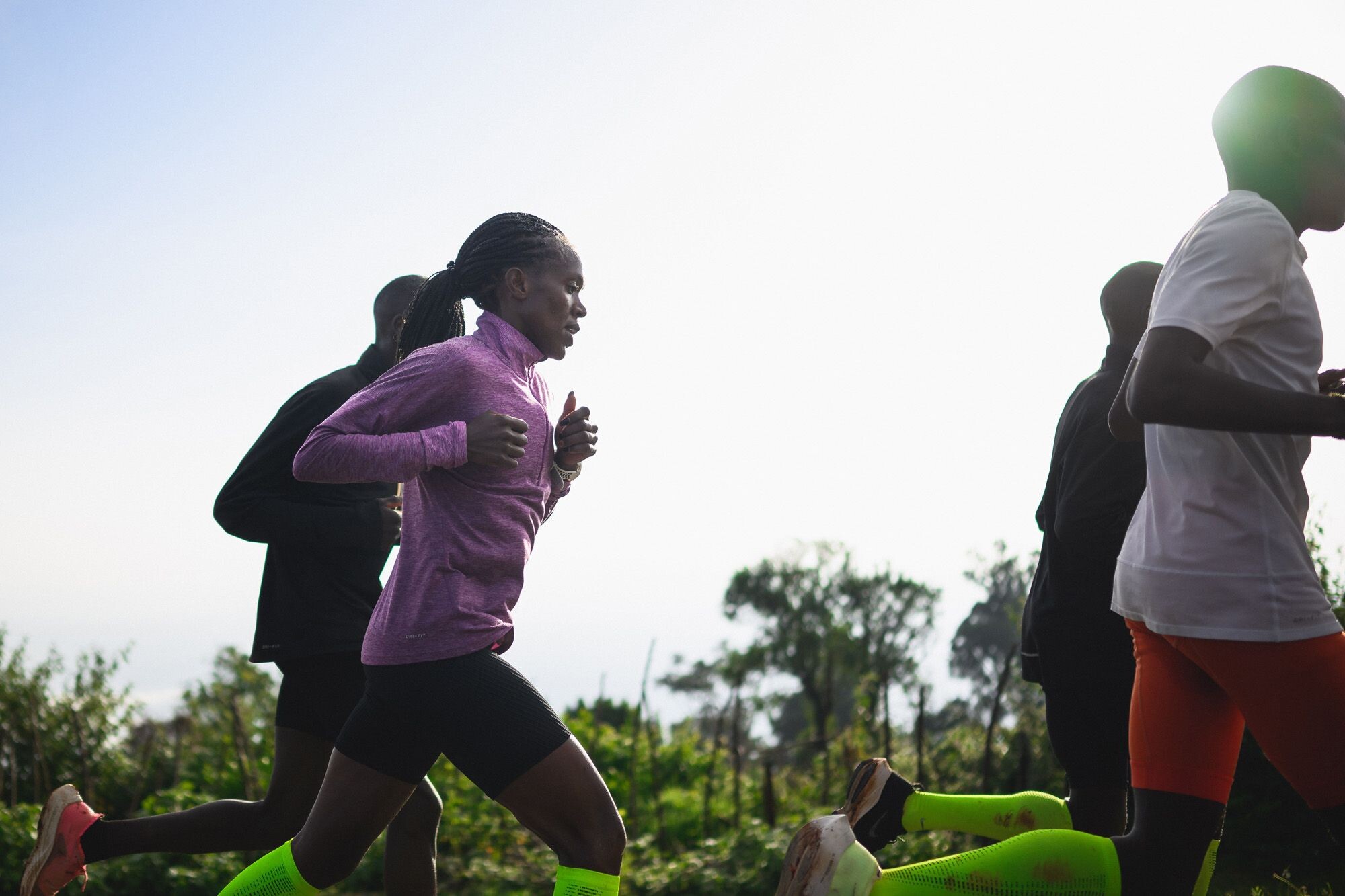
The 30 or so athletes do not eat beforehand. They have determined that there are benefits to running fasted, the most prominent being training your body to get better accustomed to taking energy from your body’s fat reserves, something that may be important when carbohydrates sources are depleted towards the end of a marathon.
Of course, these are experienced athletes. For the double Olympic champion making his way to the group, he has spent 20 years building up and adapting his body to such challenges.
What is possible for Eliud Kipchoge would be simply unsustainable, and even ill-advised, for athletes new to the sport.
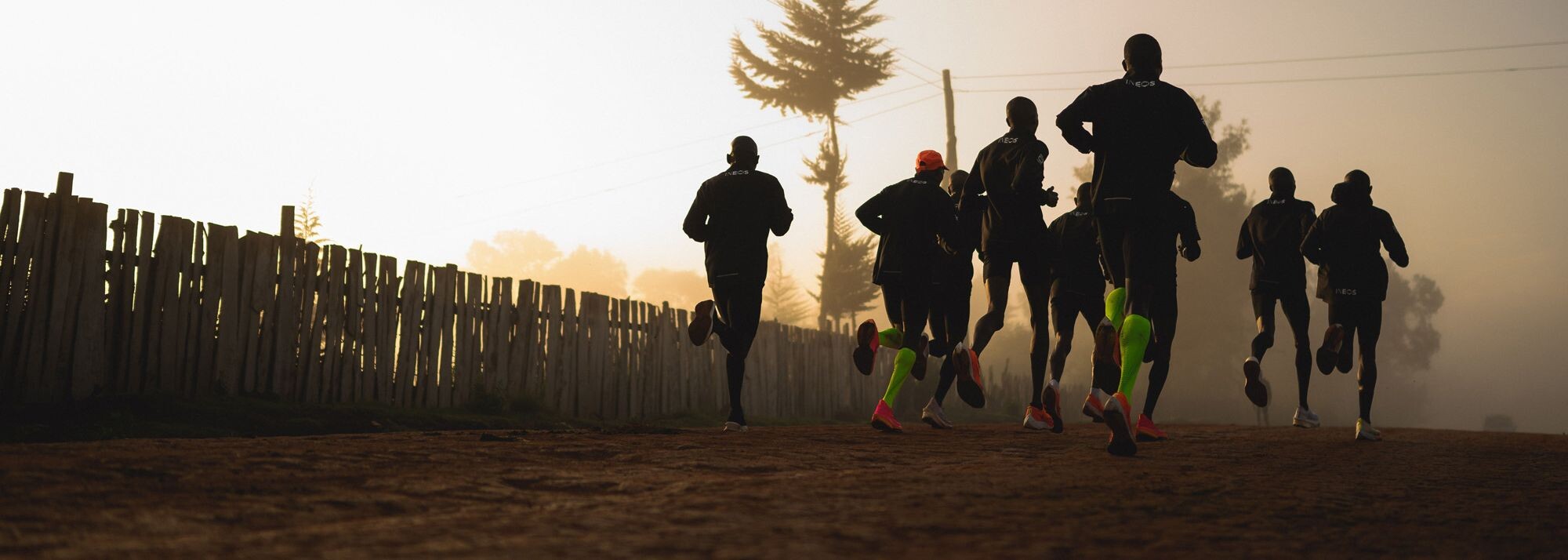
This particular morning, coach Patrick Sang has assigned the ‘Boston loop’ – an undulating route with far more elevation than its namesake marathon, eventually finishing high on the escarpment a few hundred meters higher than the 2200m starting elevation at Kaptagat.
For the Global Sports group, it is simply 40km straight out; the minibuses and pick-up trucks following them picking them up after to drive them home.
Most of Sang’s athletes training for an autumn marathon are expected to complete the full distance, among them three-time world cross-country champion Geoffrey Kamworor, fellow 2:04 marathon-man Kaan Kigen Özbilen, Kipchoge and a collection of five others all boasting either sub-60-minute half marathon or sub-2:07 marathon bests.
World and Olympic medalist Linet Masai and 2:20 marathon runner Selly Chepyego, setting off 15 minutes beforehand, have also been set that distance goal.
For world and Olympic champion and multiple world record-holder Faith Kipyegon, today’s task is 30km. Despite being on the longer end of what might be expected from a 1500m runner, Kipyegon is insistent that this run is her favorite type of training.
It may also be some indication of the strength shown in her 5000m world record in Paris.
Sang’s final instructions are minimal. He does not prescribe paces, simply asking that his athletes set an honest pace, go on how they feel and try if possible to pick up the pace towards the end of their run.
The early footsteps are on a dirt road, the group paying attention to where their marathon-specific shoes land and running in silence. Information about tree routes or dips in the road is often communicated via hand signals pointing to the hazard.
From the off, the going is uphill and within 10km the group is receiving the first of their carbohydrate drinks being passed from the pick-up truck following them.
After 15km the group hits the first of the tarmac roads of the C51 and the pace then starts to rise, slowly and subtly.
As they do, they gradually catch the groups ahead of them.
Geoffrey Kirui, the 2017 world marathon champion, has been told to run by himself as he is returning from an injury. Sang has intentionally encouraged Kirui not to fall into the usual pitfalls of over-exerting himself to go with a group.
Likewise Daniel Mateiko – the ninth fastest half-marathon runner in history, boasting a 58:26 best – was told to set off a few minutes before and will then join the group up to about the 35km marker. Still only 24 years of age and racing over a shorter distance, Mateiko’s training has its own minimal differences with the shorter-distance athletes generally doing shorter long runs.
Throughout the run, Sang will come alongside in the pick-up, judging his athletes’ efforts from the way they run. He later tells us he can notice minor indications from the way they land their feet on whether recent training has taken its toll.
Little advice is given; those he coaches have done this route many times before. More welcome instead are the drinks passed around every 5km or so. The group stays intact for almost 30km before it slowly fragments, Sang encouraging his athletes to sustainably push their effort over the final kilometers.
Kipyegon herself is nearing the end of her run, gradually progressing throughout the 30km but not pushing herself to the point of depletion.
Unfortunately for her, the moment her watch completes the distance, a few minutes over two hours after she began, is almost the highest point the group will reach that day.
She stops, jogs slowly for a few hundred meters before jumping in the van.
About a litre of carbohydrate drinks consumed after her run, she will not eat until an hour or so later when the whole group returns to the camp.
A long line of runners scattered along the road has yielded to a few isolated pockets completing the full distance and the leading group has whittled down to four.
Though interspersed with steady rises, the final five kilometers are slightly downhill. Kipchoge, Özbilen, Laban Korir and Hillary Kipchirchir run four abreast, completing these last kilometers in a few seconds inside 15 minutes.
Two hours 22 minutes after they started, they finish their undulating 40km with over 500m of elevation at a pace about 30 minutes slower than their best marathon times. It is an effort they might refer to as ‘steady’ and one in the midst of a typical 220km training week.
Like Kipyegon, they consume about a litre of drink as they get in the vans and make the 40-minute journey home, eating a nutritionally simple meal of beans, ugali, vegetables and some protein upon their return.
Their reward? A rare afternoon without another run, some sleep and a lighter Friday of two short easy runs.
A similar routine in a different setting to runners throughout the world, there are morsels of lessons for the everyday runner.
Progress sustainably, hydrate appropriately and perhaps trust your effort over your watch.
by George Mallett for World Athletics
Login to leave a comment
The simple, yet effective, diet of Eliud Kipchoge
If you think a high-performance diet needs to be complicated, think again. In an interview with Kenyan news outlet Nairobi News, marathon world record-holder Eliud Kipchoge revealed that he adheres to a simple yet effective diet that supports his intense training and racing schedule. Fresh off his fifth win at the Berlin Marathon, Kipchoge’s diet seems to be working for him, and now we know what keeps the world’s best marathoner going.
It’s about balance
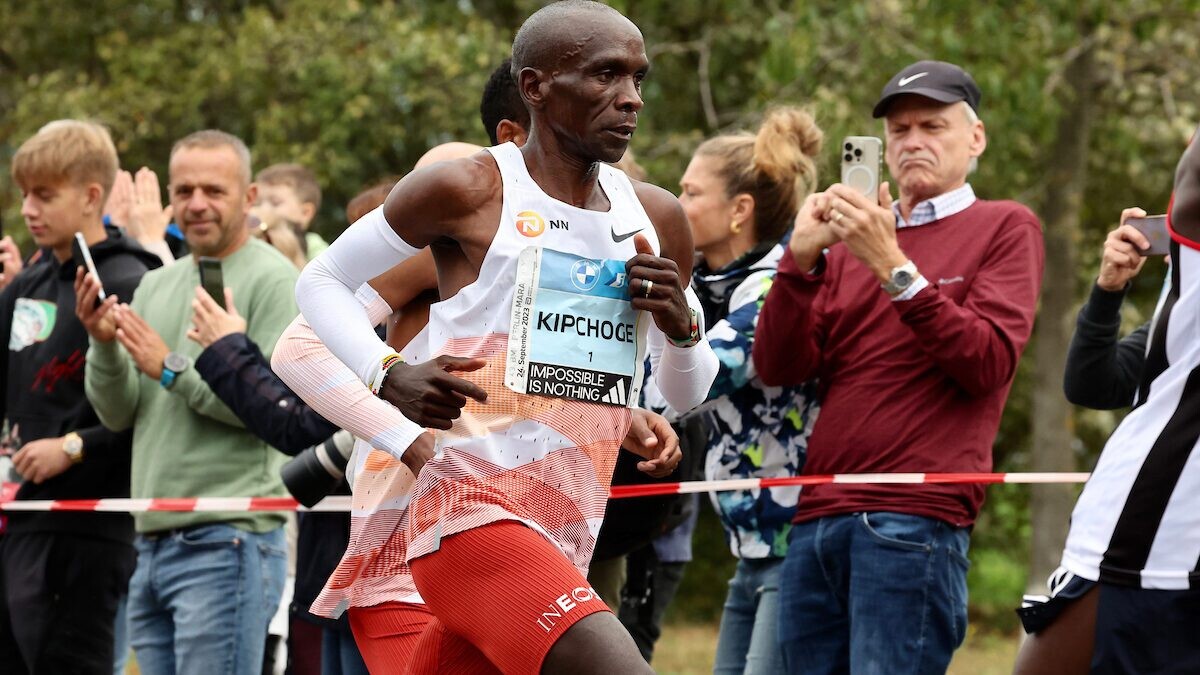
Like most elite runners, Kipchoge’s diet revolves around a balanced mix of protein and carbohydrates. One of Kipchoge’s favourite foods is the Kenyan staple, ugali, a maize meal porridge he typically enjoys with lean beef and a side of nutrient-rich vegetables, like managu, cabbage or kale. Kipchoge usually incorporates other carbohydrates into his meals, often accompanying his ugali with beans, potatoes, or chapati. When he travels, he opts for the classic pre-race meal of runners everywhere–pasta
Good nutrition starts in the morning
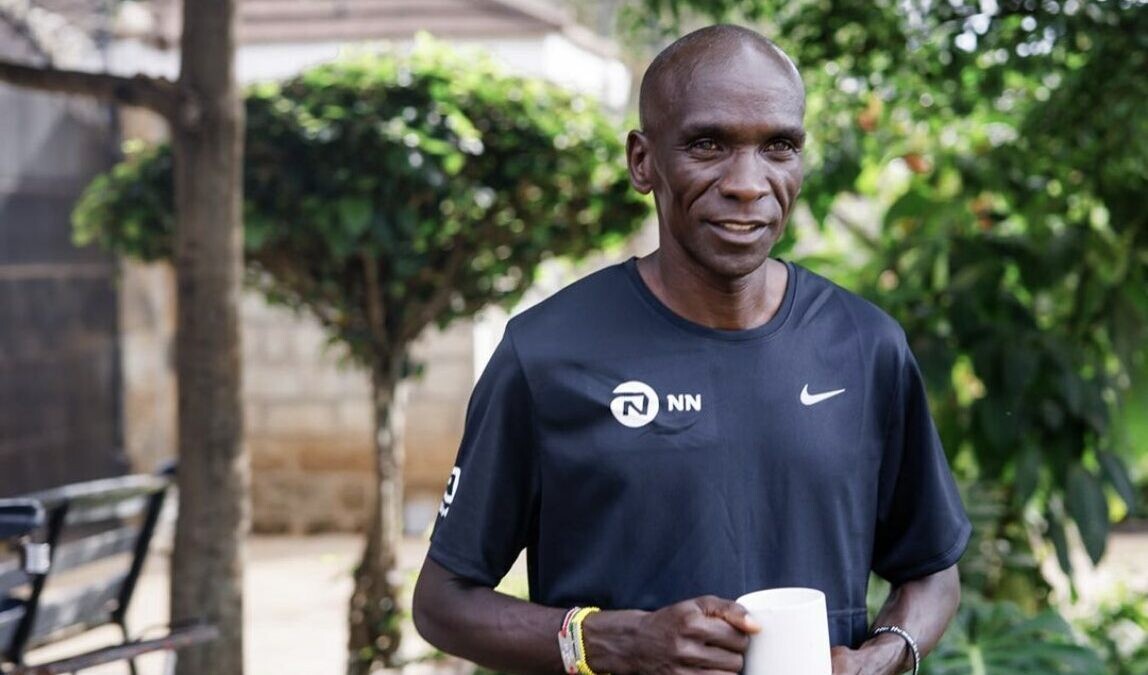
To kickstart his day after long training runs, Kipchoge’s breakfast typically consists of a combination of white tea, bread, and various fruits. On race day, he opts for slightly lighter breakfast options like cereals and milk or oats, ensuring he eats enough to fuel his race without overwhelming his digestive system.
Hydrate, hydrate, hydrate
Hydration is also a key component of Kipchoge’s regimen. He constantly aims to drink three litres of water per day, replenishing the fluids lost through sweat during his intensive workouts. He sometimes enjoys plain milk or mursik, a traditional fermented milk popular in Kenya.
Carbs are key
Kipchoge’s nutritionist emphasizes consuming the right carbohydrates to enhance his endurance performance. This includes foods like rice, pasta, potatoes, oatmeal, bananas and pancakes in his diet. His nutritionist points out, however, that runners should be cautious when including a lot of whole grains or high-fibre carbohydrates in their diets since this can cause gastrointestinal distress for some.
Keep it simple
Despite his success, Kipchoge’s dietary approach remains uncomplicated, focusing on locally sourced, wholesome ingredients that provide the necessary nutrients to fuel his training. Nutrition is highly individual, so following the marathon world record holder’s diet religiously is not the right approach, but the simplicity of his diet is something everyone can emulate.
Your nutrition plan does not need to be complicated or expensive to be effective. By focusing on whole foods and balanced nutrition, you can get the energy and nutrition you need to perform at your best.
by Brittany Hambleton
Login to leave a comment
Elvis Cheboi carries Kenyan hopes at TCS Toronto Waterfront Marathon
Although he may not have the fastest personal best time in the field Kenya’s Elvis Cheboi will certainly be a contender when the 2023 TCS Toronto Waterfront Marathon gets underway on October 15th.
The 27-year-old made his debut at the Vienna Marathon April 23rd and after running with the leaders through the first half in 62:44 he struggled home in 7th place with a time of 2:10:21. The result left him wondering if he would ever put himself through such torture again.
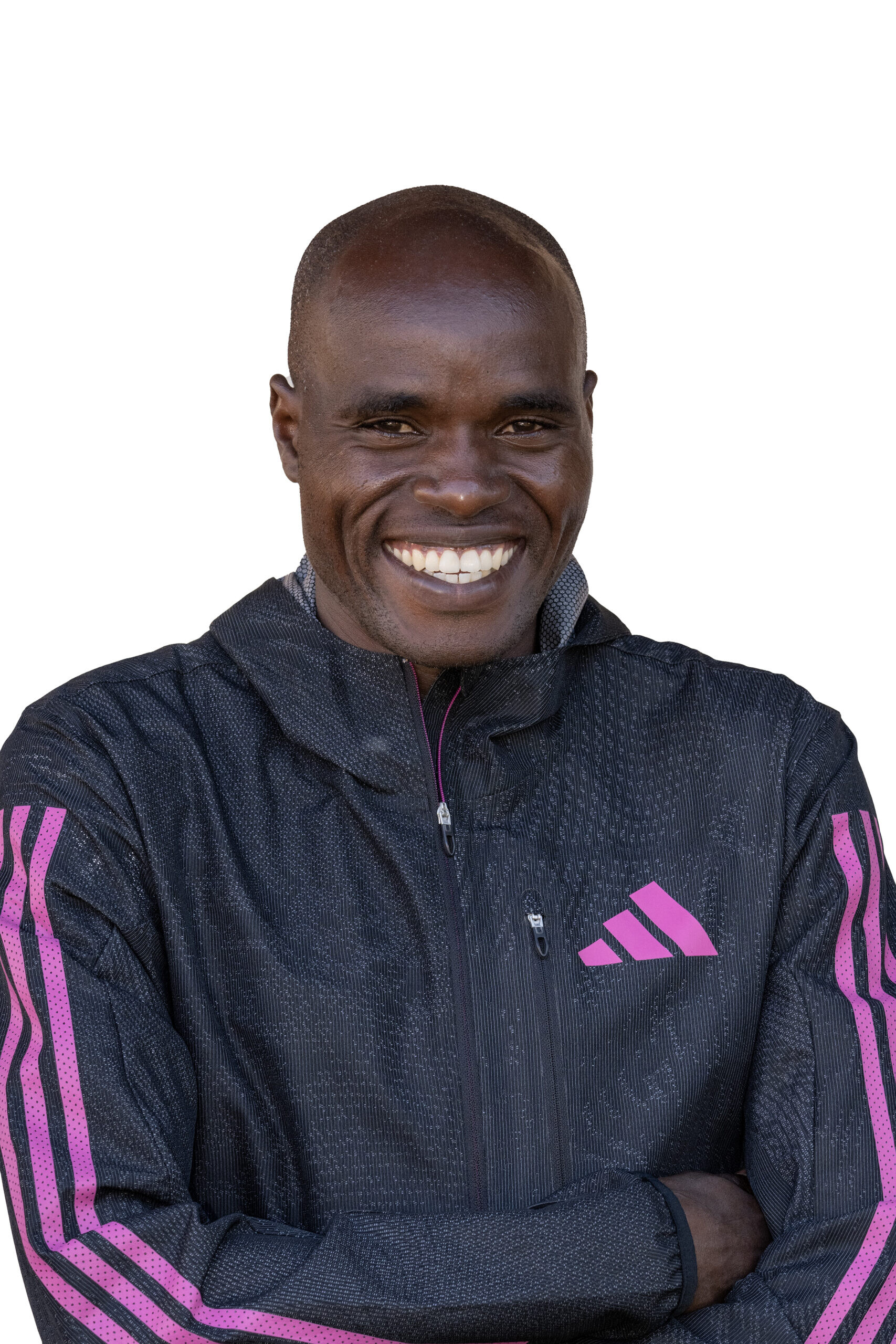
“It was tough but I accepted it,” he says with a smile during a video call from Iten, Kenya. “You see, it was my first attempt so I can say I tried my best.
“After I finished I felt like I would never again run the marathon. My body was feeling pain. My coach Gabriele (Nicola) helped me and encouraged me with a lot of wisdom and said ‘don’t give up you will do it one day’.”
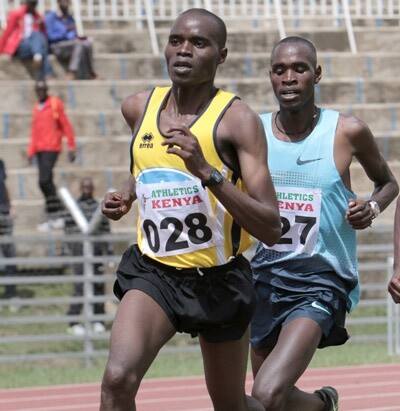
At this point coach Nicola, who is sitting with him in the lobby of Kerio View Hotel listening in, interjects pointing out that five months before Vienna his charge had recorded a personal best half marathon time of 59:15 to finish 3rd at the Barcelona Half Marathon. That’s ten seconds faster than world marathon record holder Eliud Kipchoge has ever run. Unfortunately, when Cheboi returned to Iten following that splendid result it was with a slight injury.
The pair had expected he was capable of running 2:06 or 2:07 in Vienna. Indeed the race was won in 2:05:08 by his countryman Samwel Mailu.
“This time we started preparation for Toronto in June,” Nicola reveals. “Immediately his body started to react the way it reacted when he ran 59:15 for the half marathon in 2022.
“Now he is building the shape. It’s not hard to imagine him running sub 2:06. He will be ready to run well. How well? We will see on the streets of Toronto.”
Cheboi trains with the Demadonna Athletic group in Iten. Among the 35 athletes that train with Nicola about a dozen stay at the Kerio View Hotel through the week but Cheboi isn’t one of them. That’s because he and his wife, Ruth Korir, have two very young children – a daughter named Sharline Jerotich, 5, and a 1-year-old son, Shalom Kiplagat.
Their house is about five kilometres from the training centre and sits on some land they own.
“When I am done with training, like this evening, I play with my children and also teach my girl, who is now in school, how to do her homework,” he says. “I help her with education.
“At night I usually watch television mostly CNN. My favourite is CNN and maybe National Geographic. There are so many animals on that channel.”
Like many professional runners in East Africa he is using his earnings from running to prepare for his family’s future.
“Back at my home I also farm,” he says with a smile. “I have animals and also plant maize, potatoes and wheat. This year I have cows, sheep and goats and also I planted some wheat and maize. You know, here in Kenya we like maize because of Ugali.”
Ugali, of course, is a staple on the tables at homes in Kenya and served often with beef stew.
Among those he trains with are two world-class marathoners in Joshua Belet who ran 2:04:33 in the 2023 Hamburg Marathon and Kiprono Kipkemoi who was second at Toronto Waterfront Marathon last year.
“I don’t know much about Toronto but I asked Kiprono about Toronto but he didn’t tell me much yet,” he says. “But I will meet with him again about it.”
Among Nicola’s female athletes is Magdalyne Masai who set a Toronto Waterfront Marathon course record of 2:22:16 in 2019. The coach has arranged a meeting with her so Cheboi can gain more insight into the course and all its features.
“It’s not exactly like a refreshment station but you learn to drink on the run,” Nicola explains. “Secondly you will know how to grab a bottle and not lose time during the race.”
Unusual for a Kenyan runner when asked whose performances inspired him when he was starting out as a runner Cheboi answers ‘Kenenisa Bekele,’ the Ethiopian superstar who won three Olympic gold medals and held the world 5,000m and 10,000m records until 2020.
“I can say I love Bekele. The way he ran and also from his background of running until now,” he admits although he has never met his idol.
“I encouraged myself. How Bekele runs his performances from way back you see he ran very well.”
by Christopher Kelsall
Login to leave a comment
TCS Toronto Waterfront Marathon
The Scotiabank Toronto Waterfront Marathon, Half-Marathon & 5k Run / Walk is organized by Canada Running Series Inc., organizers of the Canada Running Series, "A selection of Canada's best runs!" Canada Running Series annually organizes eight events in Montreal, Toronto and Vancouver that vary in distance from the 5k to the marathon. The Scotiabank Toronto Waterfront Marathon and Half-Marathon are...
more...Five Lessons from the Marathon Goat and his team
THE MOST REMARKABLE aspect of the fastest marathoner in history is how unremarkable—and how accessible—his training is. Eliud Kipchoge has the best resources in the world at his disposal, but rather than relying on treadmills that cost more than a Lexus or recovery devices worthy of NASA missions, he follows simple training tenets that maximize how he recovers, what he eats, his mindset, and the conditioning he does after his runs.
1. SLEEP LIKE YOUR RUN DEPENDS ON IT
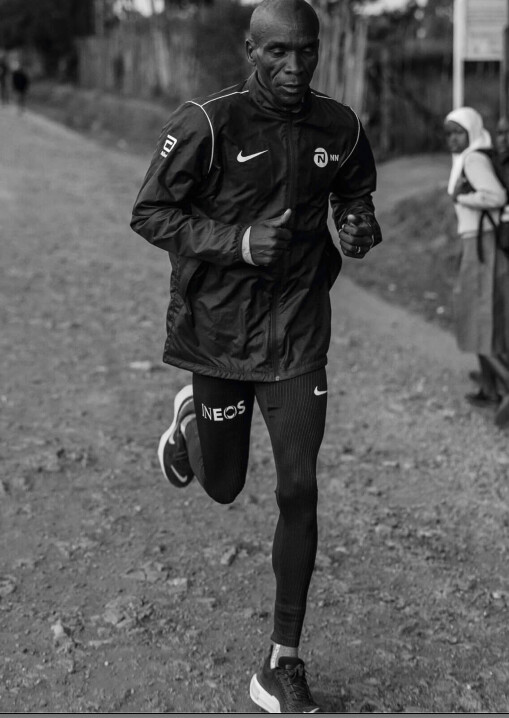
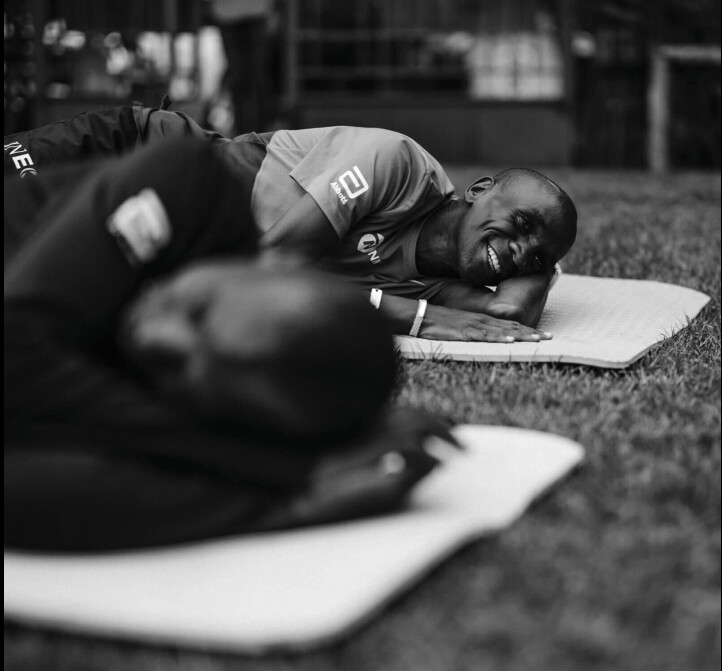
ELIUD KIPCHOGE SLEEPS up to 9 hours at night, often also taking an hour-long midday nap. Most of us don’t have the time or the 120-mile weekly workload to clock that much shut-eye, but we can still benefit from Kipchoge’s sleep hygiene cues.
At least 30 minutes before bed, he turns off or puts down all electronics. The habit reduces his exposure to blue light, known to delay the release of melatonin, leading to a decrease in sleepiness, says Kannan Ramar, MD, past president of the American Academy of Sleep Medicine. Then, instead of scrolling through social media (he prefers Facebook), Kipchoge winds down by reading at least two chapters of a book.
“If I have enough sleep, my body and my mind are free of stress and ready to go with the programs,” says Kipchoge.
While you’re asleep, your body is doing more than resting. Crucially, your pituitary gland releases growth hormone, which helps your muscles repair and grow, says Ramar.
Most runners don’t need a nap if they consistently get the recommended 7 to 9 hours, Ramar says. But when you don’t hit that target, naps can help counter short-term sleep loss and provide an energy boost for a late-day run, Ramar adds. He suggests a 20-minute doze between noon and 3 p.m. to relieve fatigue. Napping longer than 20 minutes can leave you feeling groggy due to entering a deep-sleep state, Ramar says.
2. REVIVE SORE MUSCLES WITH AN ICE BATH
TWICE A WEEK, Kipchoge takes a 10-minute plunge in his camp’s ice baths to aid his postrun recovery. It may not be pleasant, but studies find that cold water immersion (CWI) therapy like Kipchoge’s ice bath is effective. “Most research shows that over 48 hours, athletes have reported an improvement in DOMS [delayed onset muscle soreness] and sometimes corresponding improvements in strength and/or flexibility,” says Rebecca Stearns, PhD, a professor of kinesiology at the University of Connecticut.
Cold water reduces the body’s temperature, which narrows the blood vessels. This flushes metabolic waste from inflammation out of muscles to speed recovery, says Stearns. Water temperature between 50 and 59 degrees Fahrenheit for 10 to 15 minutes is cold enough to produce results, she adds.
You can set up an ice bath at home by filling a tub halfway with cold water. Then, depending on your tap temperature, add one to three 5-pound bags of ice. Stearns suggests trying CWI once or twice a week and checking with your physician to make sure you don’t have any contraindications for doing ice baths.
“It’s very intense. It’s not for everybody,” Kipchoge says. “You need to learn to relax and learn to absorb pain.”
3. UPGRADE YOUR DIET WITH PROTEIN
KIPCHOGE HAS ALWAYS maintained a highcarb diet, but after running 2:00:25 in Nike’s 2017 Breaking2 project, he began working with exercise biochemist Armand Bettonviel to improve his nutrition and further push his performance. Bettonviel, who develops nutrition plans for elite athletes, sought to up Kipchoge’s protein intake to aid his recovery as well as help to build and maintain his lean muscle.
“I’ve noticed a difference since I started to be serious about nutrition,” Kipchoge says. “Recovery is very fast, I have a lot of energy.”
While Kipchoge’s exact protein intake is confidential, Bettonviel suggests runners aim for 1.5 to 2 grams of protein per kilogram of bodyweight. For a 150-pound runner, that’s 102 to 136 grams.
Kipchoge’s meals feature Kenyan staples like ugali (a cornmeal porridge), potatoes, rice, chapati (a wheat flatbread), managu (an iron-rich leafy green), beans, whole-fat milk, eggs, chicken, and beef. Meat is only served about half the week, so to hit his protein goal Kipchoge drinks mala, a local sour milk, says Bettonviel. Every 6 ounces has about 7 grams of protein, making it comparable to kefir found in most stateside dairy aisles.
Bettonviel also introduced a high-protein porridge to the camp menu (Kipchoge eats it with fruit after training) made with whey protein and teff, an ancient grain that offers 10 grams of protein per cooked cup. You can DIY by mixing a half scoop of protein powder with whole-grain teff—stocked at many grocery stores and sold on Amazon—and cook it similarly to oatmeal. Alternatively, Kodiak Cakes makes oatmeal with whey protein and 12 grams of protein per serving.
4. MEDITATE TO BUILD MENTAL STRENGTH
KIPCHOGE IS AN especially mindful runner, says his coach Patrick Sang. While training and racing, he focuses on his breath and his movements, and aims to minimize outside distractions. It’s a skill that helps him embrace the pain and challenges of a marathon.
Mindfulness—a practice of focusing your awareness on the moment, with a kind and curious attention in a nonjudgmental attitude—can benefit any runner, says Corrie Falcon, director of mindfulness-based training for athletes at the University of San Diego Center for Mindfulness. Resting your attention on elements of a present moment, like your breath, heartbeat, or even a drip of sweat, can prevent you from getting caught in an inner dialogue mid-training or competition that may unravel your focus.
“In moments of high stress before or during a race, mindfulness has been shown to reduce the production of stress hormones, reduce blood pressure and heart rate, improve emotional regulation, and promote relaxation in the body,” says Tara Zinnamon, PhD, a neuroscientist and meditation teacher.
Kipchoge credits his focused, spartan lifestyle for developing mindfulness, but it can also be cultivated through a consistent mindfulness routine. Even just 12 minutes of guided meditation five days a week for one month can be effective, says Amishi Jha, PhD, a professor of psychology at the University of Miami.
If guided meditation seems outside your comfort zone, Falcon recommends a strategy you can try while running. She describes it as a “sense practice.” Run in silence. For two minutes, focus on what you see, then focus on sound, followed by what sensations you feel, and then smell. “And when you have a thought, label it ‘thought’ or ‘thinking’ and return to the present moment experience through the senses,” says Falcon.
5. BUILD BONUS ENDURANCE ON A BIKE
TO BOOST HIS training volume without increasing his risk of a running injury, Kipchoge rides a stationary bike for an hour twice a week after his runs.
Cycling is a concentric (shortening) muscle-contraction activity, which is easier for muscles to recover from, says Colorado-based coach Bobby McGee, who has worked with runners and triathletes (including Olympic gold medalist Gwen Jorgensen) for more than three decades. In running, the primary loading is eccentric (lengthening), which is more demanding and damaging.
“A one-hour endurance run is limited by leg fatigue, not heart and lung fatigue. A two-hour ride doubles the cardio conditioning but has minimal leg-muscle damage,” says McGee.
Kipchoge spins at an easy pace, which he says also helps reduce muscle soreness. “Cycling is a far more effective recovery modality than an easy run, especially for bigger runners with a slower cadence,” says McGee. He recommends cycling no more than twice weekly and for less than 20 percent of your overall training time.
Login to leave a comment
Recover like Kipchoge: three simple ways you can be like the GOAT
The world’s fastest marathoner knows how to take care of himself. Eliud Kipchoge, 38, lives and trains at the NN Running camp in Kaptagat, Kenya. While the athlete is constantly in demand to share his wise words and insight with the world, he knows how to say no (he calls it Vitamin N) in order to keep his focus where it is most needed.
Here are three simple ways Kipchoge makes sure he takes care of his body and mind during his downtime. Most of us wouldn’t be able to keep up with Kipchoge on a training day, but we can certainly follow his recovery plan.
Sleep is essential
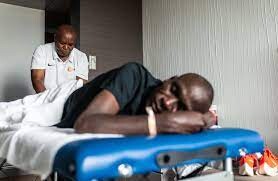
Aim for a minimum of 8 hours of sleep a night. Research increasingly shows how essential sleep is to all aspects of our lives, and how detrimental spending months or years sleep-deprived can be. Kipchoge gets close to 10 hours of sleep daily.
Kipchoge follows a strict sleep schedule, heading to bed by 9 pm at night and rising at 5:45 am. He also fits in a daily nap. Sports writer and commentator Cathal Dennehy spent three days in 2021 at Kipchoge’s training camp, and writes: “Despite the many demands on his time, he’s very, very good at doing nothing.”
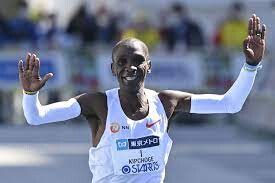
Hydrate well, and eat nutritious food
The exact amount of water we need to drink is oft-debated, but you’re probably not drinking enough. Kipchoge hydrates well and his diet consists largely of simple, whole foods. The GOAT has worked with a nutritionist to tweak his diet for optimal performance, including adding more protein. Many runners tend to eat less on recovery days, thinking their bodies don’t need as many calories–but we actually need to dial in nutrition on recovery days to help our bodies repair tissue damage and become stronger. Protein is essential.
Dennehy observed that Kipchoge eats simple, mainly local food: “homemade bread, local fruits and vegetables, lots of Kenyan tea, some meat, and a generous daily helping of his favourite–ugali, a dense maize-flour porridge.”
Massage and physiotherapy are fantastic (but so is listening to your body)
Kipchoge sees his long-time physiotherapist, Peter Nduhiu, twice a week for a massage. The athlete hasn’t reported any major injuries, and Nduhiu says there’s a reason for that. “He hasn’t had injuries, but he makes it easy for me, because he follows what the coach says,” he explains. “If you’re managing an issue and tell him to slow down, he does exactly that.”
Massage and physiotherapy are fabulous tools if they are accessible to you. If they aren’t, self-massage and mobility work can help. Most importantly, listen to your body: if Kipchoge slows down to help his body recover well, so can you.
by Running Magazine
Login to leave a comment
G.O.A.T. Eliud Kipchoge reveals his secret to success
World marathon record holder and Olympic champion Eliud Kipchoge reckons that his secret to longevity is taking sports as a profession and proper planning.
The 37-year-old Kipchoge, who has been running for the last two decades, said that loving athletics as a sport and focusing on his preparations rather than what he will earn from it are what has made him last long.
Kipchoge called on fellow athletes to invest in their careers, available time and earnings wisely, noting that the life span of a sportsperson is short.
“Focusing on preparations and not financial gains first will make an athlete go far,” said Kipchoge.
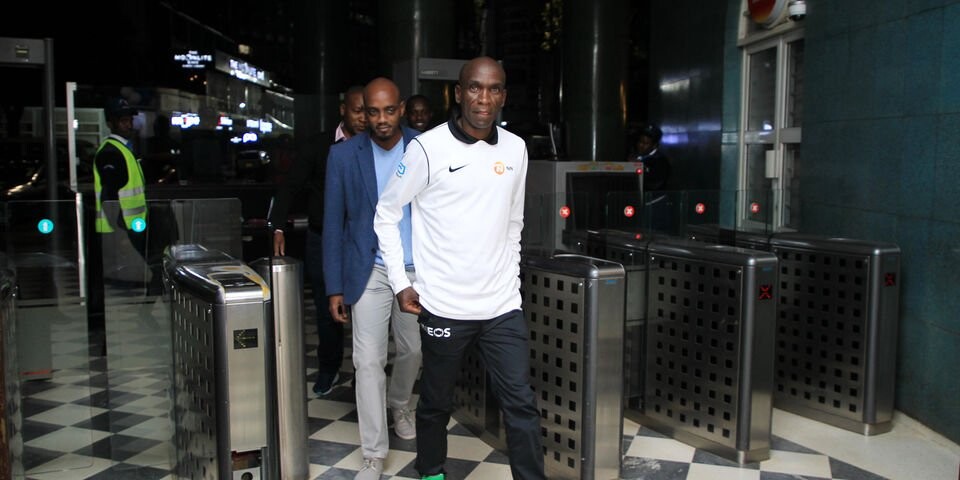
“I discovered treating sports with respect and like any other well-paying job and career quite early and it has worked for me.”
Kipchoge noted that it is good to have goals, but putting in place working systems enables someone to achieve more.
“It’s always good to have goals but that is not as important as having good systems, Goals solve problems temporarily,” noted Kipchoge.
Kipchoge was speaking on NTV’s live sports show SportOn hosted by Bernard Ndong and James Wokabi on Monday night.
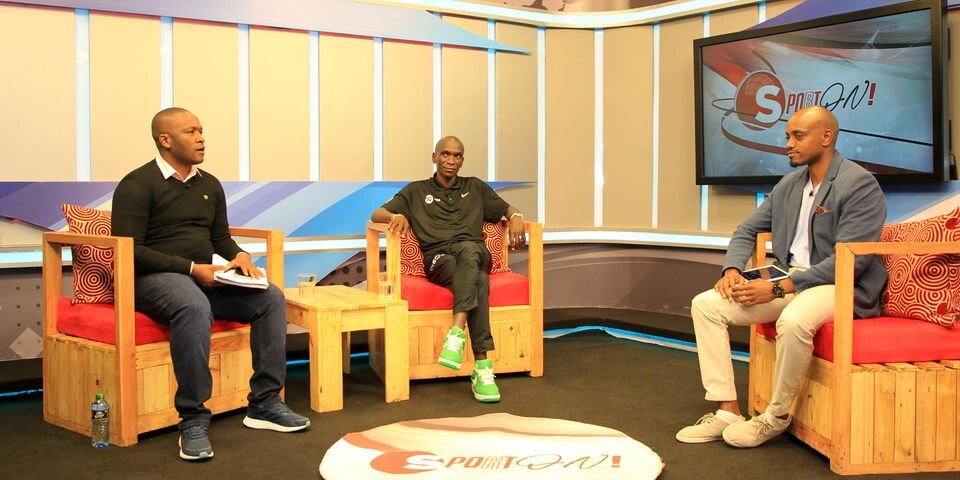
Kipchoge recaptured the Berlin Marathon title, smashing his own world record by 30 seconds on September 25 in the German capital.
It was yet again poetry in motion as Kipchoge clocked 2:01:09 to win, beating his previous world record time of 2:01:39 set when winning in Berlin in 2018.
Kipchoge disclosed that the secret to success wasn’t rocket science, but planning in small bits to success.
“One must remain consistent all through for good results hence no quick fixes,” said Kipchoge, who was received at the Nation Centre by NTV's Head of Broadcasting and Executive Director (Transformation), Monica Ndungú.
Ndungú was accompanied by Nation Media Group Managing Editor (Sports), Elias Makori and Head of Marketing, Philbert Mdindi.
Kipchoge noted that embracing professionalism always defines a professional athlete from an amateur.
“A professional will plan and follow his program to the later but an amateur is full of life, running up-and-down aimlessly, “said Kipchoge, adding that is what keeps him going is his love for running.
“I feel satisfied and the urge to do more when I know I have inspired someone or a generation. What I see on my social media platforms by people embracing what I am doing across the world drives the hunger in me,” said Kipchoge.
An ardent reader, Kipchoge disclose that what inspired him before heading to Berlin was the book “The Practice of Groundedness: A Transformative Path to Success That Feeds--Not Crushes--Your Soul’ by Brad Stulberg, an internationally known expert on human performance, well-being, and sustainable success.
“I succeeded in most cases when I discovered the secret to reading. Success is approached from different angles.
“I read 20 pages a day in a book and that is three books a month. To get to learn a lot and be more knowledgeable when you read books,” said Kipchoge, who reads after training at 5pm.
Kipchoge, whose favourite meal is maize meal (ugali) and any traditional vegetables, also loves listening to US Pop star Kelly Clarkson's music especially –Stronger ( What doesn’t kill you, makes you stronger).
With the world celebrating World Mental Health Day on Monday, Kipchoge noted that sportsmen and women who win easily have good mental health.
“Matches and races are won mentally and not the training invested,” said Kipchoge, adding that his most successful race was when he broke the two hour mark, running 1:59:41 during the INEOS 1:59 Challenge at Prater Hauptallee, Wien course in Austria on October 12, 2019.
However, the time wasn’t recognized as a world record because it wasn't conducted under regular conditions.
“That race was not only critical to me but human nature. I made history as the first man to run a marathon under two hours,” said Kipchoge. “I know someone might in future run in a normal; event but I am glad to be the first one to run under any conditions and that has inspired many.”
Kipchoge said his record-breaking feat in Berlin has finally settled.
“I am happy that I have continued to inspire many. I think I could have run under two hours if the pacesetters went up to the 30km mark,” said Kipchoge, adding that he knew he would break his own record when he looked at the splits time after 25km and 30 km.
However, Kipcgohe wondered why people are focused on whether he will run under two hours in a normal race soon.
"I don't understand why people are asking that when I did it at the Ineos Challenge," said Kipchoge in a laughter.
Kipchoge advised fellow sportsmen and women to desist from doping saying that besides ruining their reputation, they are putting their health in grave danger.
"You better be slow and sure and succeed. I appeal to the young generation to train well and love sports. It will treat them well," said Kipchoge.
He will on Tuesday be hosted for a media breakfast by Isuzu East Africa in Nairobi.
by Ayumba Ayodi
Login to leave a comment
Kenya’s Hellen Obiri is moving to Colorado to pursue her marathon ambitions
When Hellen Obiri moves 14,000 kilometers from Kenya to Colorado later this year, she already knows she'll miss some of the comforts of home.
That includes Kenyan food and the country's staple of ugali -- a dense porridge made from maize flour.
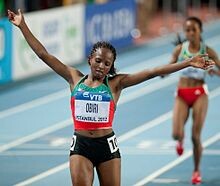
"Kenyans, we like eating ugali," Obiri tells CNN Sport. "I will have to find where I'm going to make my Kenyan food over there (in the United States)."
A good ugali may hold the keys to successfully fueling the next steps of her distance-running career. Obiri, a two-time world champion over 5,000 meters, is racing her first ever marathon in New York later this year, ahead of which she will team up with a new coach and new training group in Boulder, Colorado.
It's common for distance runners to make the move from track to road racing towards the end of their careers, but less common to do so by moving halfway across the world in the way Obiri has planned.
At the start of this year, the 32-year-old joined On Athletics Club (OAC), an elite team based in Boulder and led by former distance runner Dathan Ritzenhein. She hopes to move to the US next month in advance of racing the New York City Marathon on November 6.
"We've been wanting to move to the USA for training and to live there, so for me it's not a difficult move," Obiri, who will be based outside Kenya for the first time in her career, tells CNN.
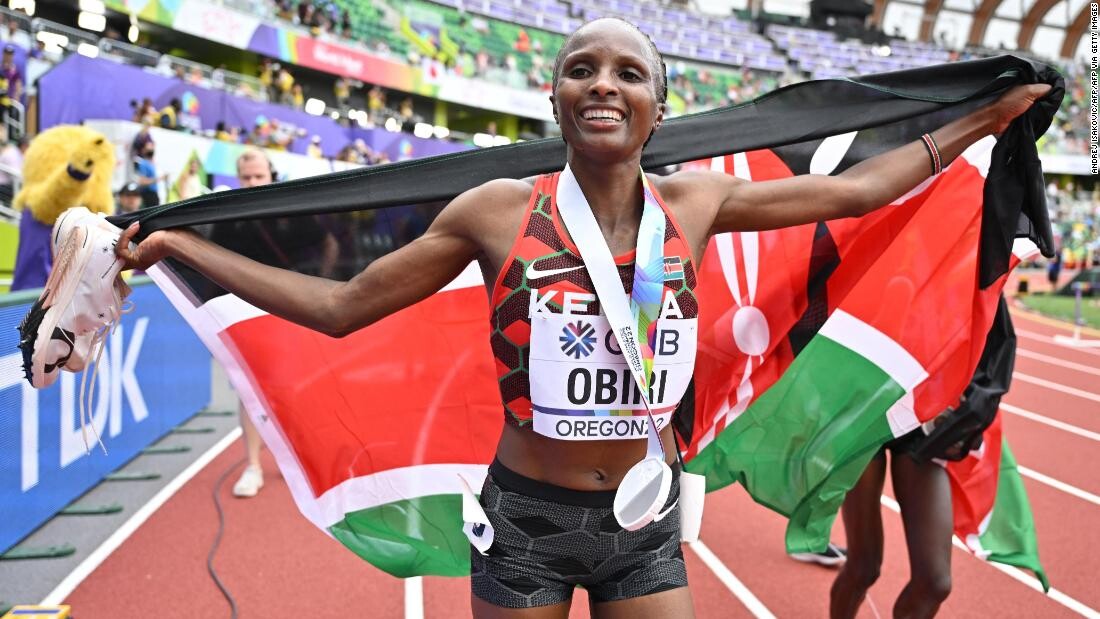
"I think as an athlete and for my family, I want to move there to acclimatize well as soon as possible ... It will take me two weeks at least to get used to it and catch up with my training.
Boulder's high-altitude, rolling trails and temperate climate make it an ideal location for distance runners. There, Obiri will join a relatively new team in OAC, which was launched by the Swiss sportswear brand On in 2020.
Under Ritzenhein's guidance, Obiri has already started her marathon program and this week increases her training load from 180 to 200 kilometers of running per week. She begins the next chapter in her career having established herself as one of the best 5,000 and 10,000-meter runners in the world over the past five years.
Just last month, she won a silver medal in the 10,000m at the World Athletics Championships -- clocking a personal best of 30 minutes and 10 seconds -- and has won 5,000m silver medals at the past two Olympic Games to go alongside her two world titles in the event.
'It showed me how strong our bodies can be,' says amputee athlete Jacky Hunt-Broersma after running 104 marathons in 104 days
Her debut in New York will be the first indicator of how Obiri's track-running pedigree translates over the 26.2 miles of the marathon.
"I can't say I'm going to target this time or this time -- it's my debut," she says. "I can't say maybe I want to do sub 2:20, 2:25 because I know the New York Marathon is a tough course, especially the second half."
Starting on Staten Island, the challenging course undulates through New York's five boroughs before finishing down Fifth Avenue and into Central Park.
"For me, I want to train well because it's my debut, and for sure, I'm looking forward to running a good race -- I'm looking forward to running my own race with no pressure and to finish well," Obiri adds.
She says she will miss racing her favorite distance of 5,000m but won't fully hang up her track spikes with the switch to marathon running.
"You can't move up to the marathon without speed," Obiri explains, adding that she hopes to stay sharp by competing in 5,000m races in Kenya next year.
The immediate focus, however, is on getting settled with her family in the US. Obiri hopes, visa-depending, that her seven-year-old daughter, Tania, will move in time to watch the race in New York.
"She's going to be so excited to go outside the country," says Obiri. "She actually watches most of my races and she's so excited about me winning some races over there.
"When I'm out at a race, she knows mommy's not around, mommy's going out there to do some work. She actually calls me and says: 'Mom, do your best and be number one.' She always wants me to be number one."
Obiri's daughter won't be the only one holding high expectations at the NYC Marathon. Kenyan athletes have dominated the event over the past decade with eight winners in the women's race since 2010, and those watching back home will be hoping Obiri can add to that legacy.
But regardless of how she performs, when she winds her way through New York's five boroughs in November, Obiri will signal the start of a new stage in her running career and a new adventure for her family.
by George Ramsay
Login to leave a comment
TCS New York City Marathon
The first New York City Marathon, organized in 1970 by Fred Lebow and Vince Chiappetta, was held entirely in Central Park. Of 127 entrants, only 55 men finished; the sole female entrant dropped out due to illness. Winners were given inexpensive wristwatches and recycled baseball and bowling trophies. The entry fee was $1 and the total event budget...
more...Kenyans race walkers Gathimba and Ngii eye redemption in Commonwealth Games
Africa 20 kilometers race walking champions Samuel Gathimba and Emily Ngii are hoping to redeem themselves at the Commonwealth Games scheduled for July 28 to August 8 in Birmingham, England where the discipline is shortened to 10km.
The duo missed out on medals in the 20km Walk at the World Athletics Championships which ended on Sunday in Eugene, USA.
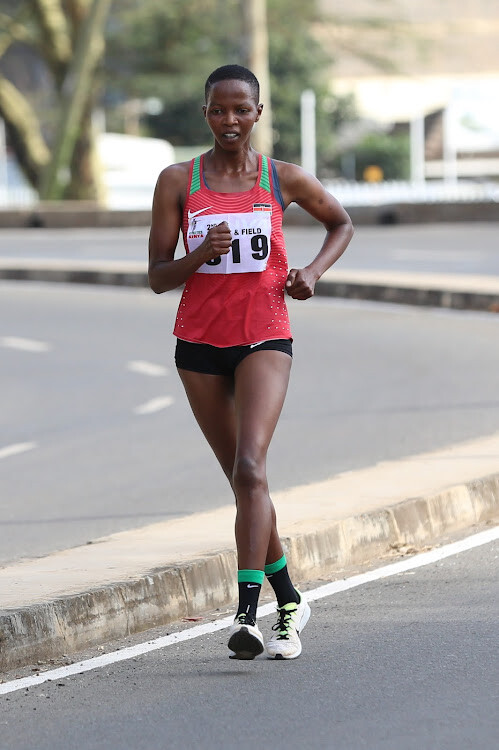
Gathimba, who came closest to a medal after finishing fourth in Eugene, has predicted a fierce battle in Birmingham.
"I arrived here (UK) on Tuesday night to a very cold Birmingham. I hope the weather will improve. I'll start training on Wednesday. I have never done 10km walk abroad, so this will be my first time. The challenge with 10km is it's like 'ugali sosa' (not the main meal), so it will be very fast.
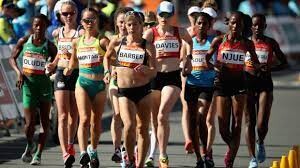
I need to get my calculations right in order to win. Doing so will also help me get invited more to competitions," said Gathimba.
He timed one hour, 19 minutes and 25 seconds just a few seconds behind medalists Toshikazu Yamanishi (1:19:07), Koki Ikeda (1:1914) and Perseus Karlstrom (1:19:18).
Ngii struggled with a stomach ache from 10km-mark on her way to 30th place finish.
"I have improved a lot after getting treatment. I'm ready. It's the first time I'm competing in 10km outside Kenya and I'm ready to bring a medal bad home, God willing," said Ngii.
Walk coach Benjamin Mbusya also expressed optimism in the duo.
"Obviously, some competition has been reduced because not all countries that were at the World Athletics Championships in Oregon are in Commonwealth Games. But I can assure you that we will get some medals and gold is possible," he said.
Gathimba won bronze at the 2018 Commonwealth Games in Gold Coast, Australia and bagged the same medal at the Race Walking World Championships in Oman in March this year.
by Geoffrey Anene
Login to leave a comment
The Commonwealth Games
The Commonwealth Games are coming to Victoria - bringing an action packed sports program to our regional cities and delivering a long-term legacy for our future. From 17 to 29 March 2026, Geelong, Bendigo, Ballarat, Gippsland and Shepparton will be on the world stage, attracting millions of viewers and creating thousands of jobs. The multi-city model will...
more...The magical Kenyan Diet and training at altitute are two keys factors why Kenyan runners are having so much success
One unique and interesting thing about Kenyan runners is their daily diet.
A diet that gives them energy to run for a long time and fast. Many wake up at 5am and eat something like a slice of bread or ugali with tea to provide energy.
Some prefer going for their morning run on an empty stomach but after training they take tea with rice or ugali. This is common in Kenya as well as drinking at least two glasses of tea in the morning.
The most important meal of the day for many Kenyan runners is lunch. Most eat a heavy amount of ugali, rice and beans/potatoes or stew depending on the athlete.
For example super stars like Eliud Kipchoge and Wilson Kipsang, love ugali with traditional vegetables like spinach accompanied by milk called mursik (sour milk).
Mursik is sour milk that taste so sweet. It contains enough proteins to help build and repair muscles due to tearing during daily training and competition. With daily intake it helps the runner be more energetic, strong and more able to be tough.
The Mursik Factor has been making headlines when an athlete wins a race or breaks a record because Mursik never disappoints. Mursik and ugali are both key. The ingredients of ugali itself is such a secret and many keep wondering where the energy of Kenyans comes from.
Ugali is a carbohydrate but has amazing ingredients. Ugali is a type of cormeal porridge and is made from maize four.
It is cooked in boiling water or milk until it reaches a stiff or dough-like consistency. 100g of maize flour contains folates 0.6mg, vitamin A 0.5mg, vitamin B1 3.0mg, vitamin B2 2.0mg, vitamin B3 14.9mg, vitamin B6 2.0mg, vitamin B12 0.007mg, iron 21mg, and Zinc 33mg.
In addition the roughage helps in digestion. On top of this energizer, the high altitude helps the body produce a lot of hemoglobin due to less oxygen giving runners an easy time to run fast in low altitude outside Kenya.
This is the magical Kenyan diet that propel Kenyan runners like a space ship going into the universe.
How can you doubt anything that Eluid Kipchoge does to run a 2:01 marathon?
by Willie Korir reporting from Kenya
Login to leave a comment
Eliud Kipchoge is a simple man who helps others - Part three of a three part series on the King of the Marathon
The King of The Marathon Part Three: an inside look into the life of Kenya's Eliud Kipchoge.
When Eliud Kipchoge passed the first 10k mark in 29:01 on September 16 in Berlin everyone was excited because he was nine seconds ahead of world record pace.
Actually this was his slower 10k split of the day. He picked up the pace and his second 10k split was 28:55, third 28:49 and fourth 28:47 clocking 2:01:39 to smash the world marathon record.
So how did he do this? It is not drugs! He has never failed a drug test.
Besides doing some unbelievable workouts (as detailed in part 2) he pays close attention to his diet. His favorite meal is ugali, kalenjin traditional milk called mursik which nutritious and energetic, traditional veggies (such as; socha, saga, mborochet, chepkerta and mitiat). These are herbal and they build the immune system and adds to the blood.
He eats roasted maize for carbohydrates. How does he relax? During leisure time he likes reading at least two or three inspirational books every month. This is where a man full of wisdom and maturity adds to his knowledge.
One quote he likes, "The impossible is possible and imitation is limitation.” by John Manson.
Eliud is a dairy and tea farmer and when he is at home he looks after cattle. His last born kid son started running so he can follow in his father's foot steps.
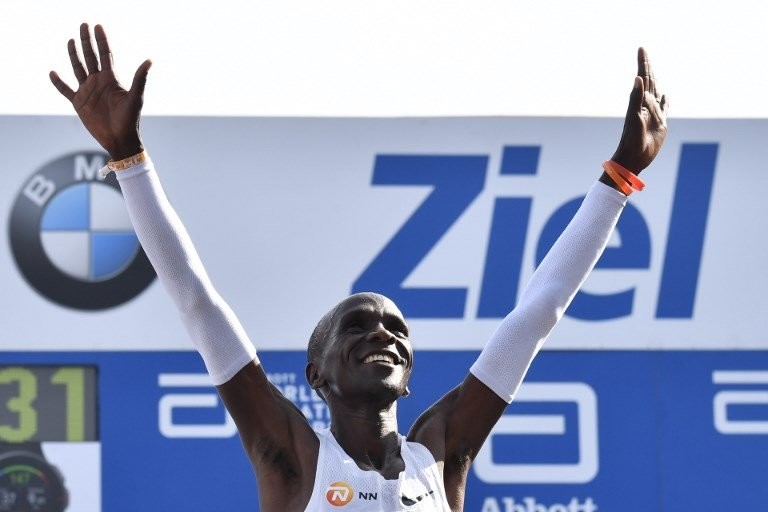
After smashing the World Marathon Record in Berlin, Eliud is expected to get $50,000 for winning and $69,000 for breaking the world record. This is 12 million Kenyan Shillings. In additon, truck manufactures, Isuzu East Africa, which Kipchoge is a Brand Ambassador, will give him a D-max luxury double cabin vehicle.
There are also gaming companies which will reward him. Eliud has involved himself in charity work too. He helps raise funds for dispensaries, pay school fees for unable kids, he helps upcoming athletes with housing and hospitals bills.
He pays for airline tickets for students going abroad on scholarship. He helps to motivate young Kenyans on the importance of hardwork. Kenya has been very proud of Eliud Kipchoge and since he smashed the world record the whole country is behind him.
(Editor’s note: Part one and two of these series were published the last two days on My Best Runs.)
by Willie Korir reporting from Kenya
Login to leave a comment
Two years ago Silas Kipruto was leading the Bix 7 when suddenly he whirled around and took a swipe at Mekonen, now they are friends
Login to leave a comment
The four white Kenyans..It's all in the training..sacrifice and quality...
"These four runners listed below live and spend long seasons in Kenya at altitude, training with Africans with their custom meals, sleeping in their cots, training at 6am, fasting, and eating ugali The White Kenyans.
1. Julien Wanders this morning ran 60:09 at half marathon in Barcelona, a new Swiss record
2. Zane Robertson from New Zealand ran a 59:47 Half
3. Sondre Moen 2:05:48 Marathon From Norway, European record
4. Jake Robertson 60:01 Half Marathon in Houston From New Zealand
"They sacrifice themselves like the Kenyans... they run like the Kenyans... It doesn't matter that their skin is not black. It's all in the training. It's the sacrifice and the quality."
by Gonzalo Sukunza
Login to leave a comment





